The Association of American Law Schools maintains a list of scholarly books published by law school faculty on this page. To submit your book for consideration for this list, please submit the form below.
Faculty Books Published in 2025
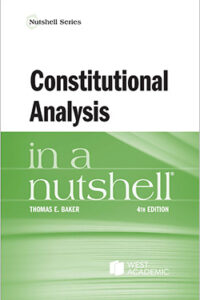
Constitutional Analysis in a Nutshell
West Academic Publishing, 2025
This authoritative text provides a framework for understanding individual liberty and governmental power and the institutional role played by the Supreme Court of the United States. The comprehensive coverage in this new and improved edition includes all the major topics: judicial review; commerce clause and state powers; federalism; separation of powers; congressional and executive powers; and individual civil rights and civil liberties. It includes diagrams that aid understanding of the fundamentals of our system of government.
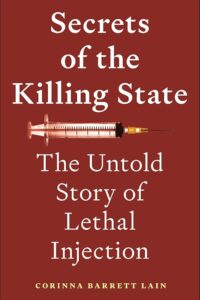
Secrets of the Killing State
NYU Press, 2025
In the popular imagination, lethal injection is a slight pinch and a swift nodding off to forever-sleep. It is performed by well-qualified medical professionals. It is regulated and carefully conducted. And it usually provides a “humane” death. In reality, however, not one of those things is true. This book pulls back the curtain on this clandestine punishment practice, presenting a view of lethal injection that states have worked hard to hide. Botched executions are a part of this story, but they are just the tip of the iceberg. For all the suffering that we see, there is also suffering that we don’t see.
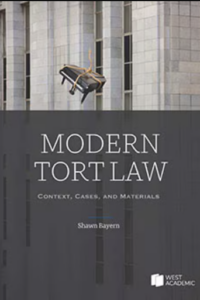
Modern Tort Law: Context, Cases, and Materials
West Academic Publishing, 2025
This modern Torts casebook highlights the most important issues in modern tort law. It combines the case-oriented focus of a traditional casebook with extensive notes that aim to clarify the subject. Adopting a functionalist and contemporary approach, the book emphasizes negligence law and shows the surprising richness and depth of modern cases on such topics as duty, breach, causation, and vicarious liability. The book highlights progress in the law over the last hundred years, includes and analyzes material from the Restatement (Third) of Torts, and contains other materials, such as jury instructions, that help students see how courts apply the law. Divided into short, easy-to-read chapters with a structure aimed to optimize student learning, the book serves as the foundation for a lively course that covers the doctrine, policy, and social goals of modern tort law.
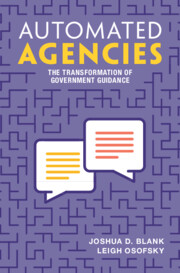
Automated Agencies
Cambridge University Press, 2025
This book is the definitive account of how automation is transforming government explanations of the law to the public. Joshua D. Blank and Leigh Osofsky draw on extensive research regarding the federal government’s turn to automated legal guidance through chatbots, virtual assistants, and other online tools. Blank and Osofsky argue that automated tools offer administrative benefits for both the government and the public in terms of efficiency and ease of use, yet these automated tools may also mislead members of the public. Government agencies often exacerbate this problem by making guidance seem more personalized than it is, not recognizing how users may rely on the guidance, and not disclosing that the guidance cannot be relied upon as a legal matter. After analyzing the potential costs and benefits of the use of automated legal guidance by government agencies, Automated Agencies charts a path forward for policymakers by offering detailed policy recommendations.
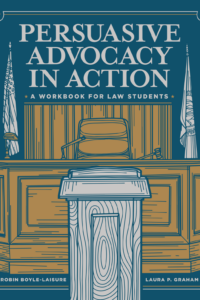
Persuasive Advocacy in Action
Carolina Academic Press, 2025
This book is designed with a singular focus: to help students hone their skills in persuasive legal writing and oral advocacy. As students navigate through its pages, they will encounter a rich tapestry of core principles, practical insights, and hands-on exercises tailored to elevate their prowess in crafting persuasive legal arguments, constructing well-reasoned briefs and other persuasive documents, and delivering compelling oral arguments. Through a blend of focused explanations and interactive exercises, this workbook empowers students to navigate the complexities of legal advocacy with confidence.
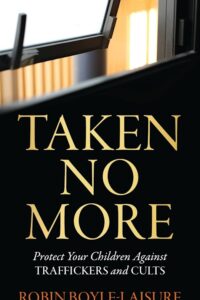
Taken No More
Bloomsbury, November 2025
Our digital age is bringing unprecedented challenges to child-rearing. Predators lurk online and in the real world, exploiting children from all walks of life. Anyone can be trafficked, and anyone can be recruited into a cult. So how do we keep our children safe?
In this book, Robin Boyle-Laisure warns parents, caregivers, and guardians about the dangers of human trafficking and cults. She offers tips on how to talk to children of any age to make sure they are aware and on guard but not sheltered, and includes an entire chapter devoted to online predatory behavior due to its ever-rising influence. Boyle-Laisure also describes the progressive stages of targeting, grooming, recruitment, coercion, and control and provides warning signs that a child is being groomed.
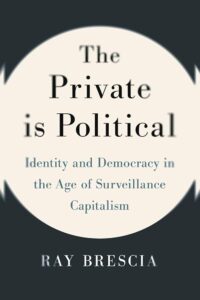
The Private is Political
NYU Press, February 2025
It has become alarmingly clear that our online actions are less private than we’re led to believe. Our data is routinely sold and shared with companies who want to sell us something, political actors who want to analyze our behavior, and law enforcement who seek to limit our actions. This book explores the failure of existing legal systems and institutions to protect our online presence and identities. Examining the ways in which the digital space is under threat from both governments and private actors, Ray Brescia reveals how the rise of private surveillance prevents individuals from organizing with others who might help to catalyze change in their lives. Brescia argues that we are not far from a world where surveillance chills not just our speech, but our very identities.
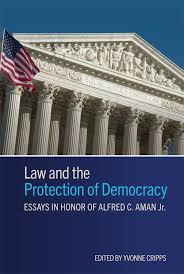
Law and the Protection of Democracy
University of Rochester Press, 2025
With international safeguards for democracy showing signs of fragility as they come under various forms of attack, the vitality of the legal imagination will be essential to the future of the democratic rule of law. This collection of essays undertakes an innovative and timely assessment of the legal system’s capacity for self-renewal. In its focus on law as a creative project in the service of democracy, the volume honors Alfred C. Aman Jr., a distinguished law professor, administrator, jazz musician, and scholar. Aman’s extensive body of work includes farsighted, and ultimately optimistic, writings drawing attention to the potential of law reform as a means of addressing democracy deficits in the United States.
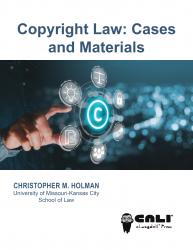
Copyright Law: Cases and MaterialsThe Private is Political
CALI, 2025
This casebook is designed for a one-semester course on copyright law. The doctrinal principles of copyright law are presented primarily through edited judicial decisions, each followed by interactive “check your understanding” questions that include detailed explanations for correct and incorrect answers. A short list of “things to consider” is provided immediately prior to each decision, designed to orient students to particularly significant aspects of the decision and provide a more focused reading experience.
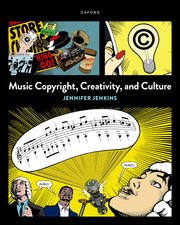
Music Copyright, Creativity, and Culture
Oxford University Press, January 2025
This book is an interdisciplinary introduction to the economics, history, and law that shape the music we love. Innovative and readable, presenting its subject through case studies, timelines, and even excerpts from a graphic novel. Presented in an accessible, easy-to-digest format that is neither dry nor obscure. It is a combination of brief “what you need to know” text and graphic novel excerpts that covers relevant, up-to-date cases in the field of copyright law.
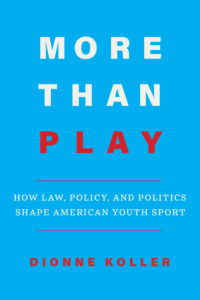
More Than Play
University of California Press, April 2025
Tens of millions of children in the United States participate in youth sport, a pastime widely believed to be part of a good childhood. Yet most children who enter youth sport are driven to quit by the time they enter adolescence, and many more are sidelined by its high financial burdens. Until now, there has been little legal scholarly attention paid to youth sport or its reform. Dionne Koller sets the stage for a different approach by illuminating the law and policy assumptions supporting a model that puts children’s bodies to work in an activity that generates significant surplus value. In doing so, she identifies the wide array of beneficiaries who have a stake in a system that is much more than just play—and the political choices that protect these parties’ interests at children’s expense.
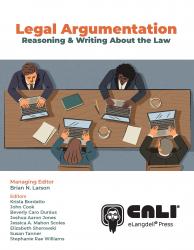
Legal Argumentation: Reasoning & Writing About the Law
eLangdell Press, 2025
This book is suitable for a two- or three-semester introduction to legal analysis, reasoning, research, and writing. It covers theories underlying legal reasoning and analysis, contexts in which reasoning and analysis occur, and many common textual and oral genres, such as memos, briefs, letters, emails, contracts, and oral communication. The book’s appendices provide extensive supplemental information and examples, including writing resources, sample student work, and annotated documents.
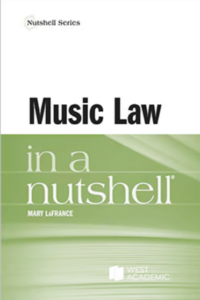
Music Law in a Nutshell
West Academic Publishing, March 2025
This introduction to music law is a compact guide to the legal issues that arise in all corners of the music industry, with particular emphasis on the decisions faced by songwriters and performing artists throughout their careers. The book covers all relevant aspects of copyright law, such as authorship, termination rights, re-recording rights, infringement, and fair use. It gives detailed attention to the roles of publishers, rights administrators, record labels, PROs, SoundExchange, and the new Mechanical Licensing Collective, and explains the array of contracts that are crucial to music exploitation, including publishing agreements, recording contracts, mechanical licenses, synchronization licenses, public performance licenses, and master recording licenses. The complex licensing scheme that applies to streaming platforms is explained in a user-friendly manner. Key aspects of trademark law are considered, including the ownership of band names. The book also explores an artist’s right to prevent the misappropriation of his or her personal identity, including name, likeness, and voice, and addresses topical issues and legislative developments related to artificial intelligence, postmortem rights, and digital replicas. Where the assertion of intellectual property rights threatens artistic freedom, First Amendment protection for creative expression receives thorough attention.
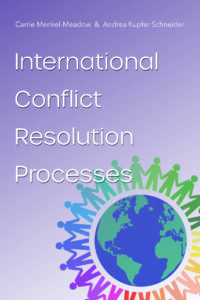
International Conflict Resolution Processes
California Academic Press, 2025
This interdisciplinary text presents the major forms of conflict resolution used in international disputes in a wide-ranging variety of topics. The text covers more traditional processes, including diplomatic and private party negotiations; conciliation; fact-finding; mediation; arbitration of commercial, trade, and investment disputes; and adjudication in the many international tribunals. It also presents many of the newer forms of hybrid dispute resolution, such as online dispute resolution and new forms of technology-assisted dispute resolution across borders; transitional and restorative justice innovations including Truth and Reconciliation Commissions and direct compensation by nation states to victims of human rights violations; and the ongoing evolution of how investor-state disputes are resolved.
Faculty Books Published in 2024
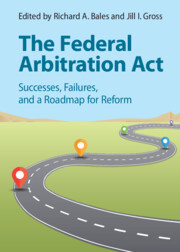
The Federal Arbitration Act
Cambridge University Press, 2024
In honor of the 100th anniversary of the Federal Arbitration Act, this volume brings together a diverse group of leading scholars and practitioners to celebrate its successes and propose specific reforms. Readers will gain insight into how the Federal Arbitration Act impacts the modern practice of arbitration and how the Supreme Court’s interpretation of the Act undermines its fairness. Focusing on domestic, commercial and consumer, as well as securities and labor and employment arbitration, this book provides a roadmap to enhance the fairness and coherence of the Act.
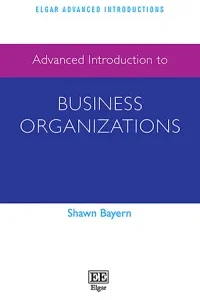
Advanced Introduction to Business Organizations
Edward Elgar Publishing, December 2024
Providing critical insights on the development of laws governing business organizations, including both general and limited partnerships, corporations, and limited liability companies (LLCs), Shawn Bayern expertly introduces and analyzes the modern forms of US business organizations. With particularly in-depth coverage of the common law of agency and important changes within the field, he emphasizes the range and flexibility of modern business forms. Bayern’s evaluation is critical and analytical, while still being an approachable introduction to a complex legal field.
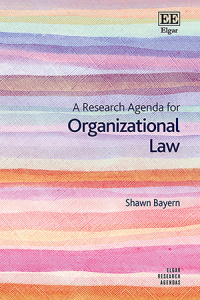
A Research Agenda for Organizational Law
Edward Elgar Publishing, 2024
Taking stock of the quiet revolution that has taken place in the field of organizational law over the last few decades, this erudite Research Agenda presents a critical overview of the current state of organizational law and explores the increasingly flexible structures and capabilities of modern organizations. Explaining and evaluating new possibilities in modern organizational law, the book demonstrates that legal organizations are much more generative than widely recognized, with the capacity to enable new configurations that combine several legal transactional techniques. Chapters consider the implications of this flexibility for monitoring, regulation, and reform, examine the effects of modern transactional creativity on the rest of the legal system, suggest how organizational statutes might be harmonized, introduce non-traditional uses of modern organizations like LLCs, and propose novel ways to regulate organizations.
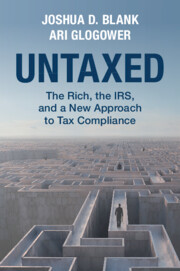
Untaxed: The Rich, the IRS, and a New Approach to Tax Compliance
Cambridge University Press, November 2024
One of the most common complaints about the tax system in the United States is that rich taxpayers are able to lower their tax liabilities through abusive tax practices, often outmaneuvering the Internal Revenue Service (IRS). Untaxed offers a fresh perspective on the long-standing dilemma of tax avoidance and evasion by the rich by proposing a new legal response: means-based adjustments to the tax compliance rules. These compliance rules govern interactions between taxpayers and the IRS, from filing tax returns to responding to audit letters to paying tax penalties. Untaxed shows how tax compliance rules can be adjusted based on taxpayers’ means to level the playing field between the rich and everyone else. Timely and innovative, this book is a must-read for legal scholars, policymakers, tax students, and anyone interested in tax policy and administration.
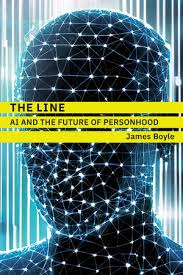
The Line: AI and the Future of Personhood
MIT Press, October 2024
Chatbots like ChatGPT have challenged human exceptionalism: we are no longer the only beings capable of generating language and ideas fluently. But is ChatGPT conscious? Or is it merely engaging in sophisticated mimicry? And what happens in the future if the claims to consciousness are more credible? In The Line, James Boyle explores what these changes might do to our concept of personhood, to “the line” we believe separates our species from the rest of the world but that also separates “persons” with legal rights from objects.
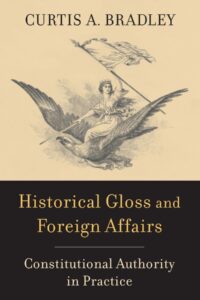
Historical Gloss and Foreign Affairs
Harvard University Press, 2024
In the more than 230 years since the Constitution took effect, the constitutional law governing the conduct of foreign affairs has evolved significantly. But that evolution did not come through formal amendments or Supreme Court rulings. Rather, the law has been defined by the practices of Congress and the executive branch, also known as “historical gloss.” The author documents this process in action. He shows that expansions in presidential power over foreign affairs have often been justified by reference to historical gloss, but that Congress has not merely stepped aside.
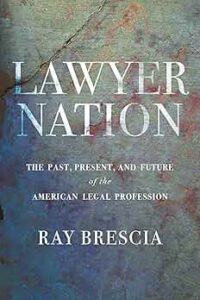
Lawyer Nation
NYU Press, 2024
The author provides concrete ideas for transforming law into a field whose services are accessible, egalitarian, and viable in the long term. Further, he addresses how the profession can improve so that the health of its practitioners is not compromised in the process. If the legal profession does not respond to its crises in an effective way, he argues, the dysfunction and unfairness plaguing the legal world will deepen. This is an unprecedented opportunity for the world of law to reimagine its future in way that honors its highest ideals: preserving the rule of law, protecting individual liberty, and addressing social inequality in all of its forms.
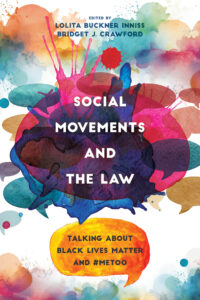
Social Movements and the Law
University of California Press, 2024
Black Lives Matter and #MeToo are two of the most prominent twenty-first-century social movements in the United States. On the ground and on social media, more people have taken an active stance in support of either or both movements than almost any others in the country’s history. Social Movements and the Law brings together the voices of twelve scholars and public intellectuals to explore how Black Lives Matter and #MeToo unfolded—separately and together—and how they enrich, inform, and complicate each other. Structured in dialogues and punctuated with informative text boxes, illustrations, and discussion questions, this accessible guide to an increasingly influential area of the law centers rich intersectional analysis of both movements and prompts readers to undertake further reflection and conversation.
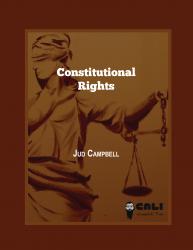
Constitutional Rights
eLangdell Press, 2024
This book is designed for a one-semester survey course on federal constitutional rights. In a time of significant doctrinal fluidity, the casebook aims to provide students with historical and conceptual tools to critically evaluate how and why the Supreme Court has shaped the landscape of rights jurisprudence. The casebook begins with a chronologically organized exploration of older ways of thinking about fundamental rights, and it then turns to discrete doctrinal areas—focusing on the Equal Protection and Due Process Clauses of the Fourteenth Amendment and the Speech and Religion Clauses of the First Amendment, along with additional material on the Second Amendment and the Takings Clause. In doing so, the casebook puts less emphasis on doctrinal minutiae and more on key themes and concepts—and particularly ones that reappear across multiple doctrinal areas.
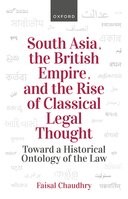
South Asia, the British Empire, and the Rise of Classical Legal Thought: Toward a Historical Ontology of the Law
Oxford University Press, 2024
The book considers the legal history of colonial rule in South Asia from 1757 to the early twentieth century. It charts a shift in the ontology by which notions and practices of sovereignty, land control, and adjudicatory rectification were aligned. This involved a transition from a formative period under East India Company rule focusing on ‘the laws’ more than ‘the law’. Underpinning the Company’s ontology of ‘the laws’ was an idea of absolute property that was translated into doctrinal terms as a duty of remitting rent more than any notionally physical dominion.
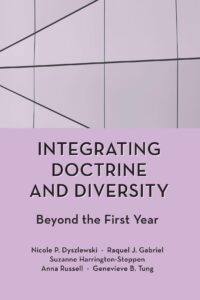
Integrating Doctrine and Diversity
Carolina Academic Press, January 2024
This companion volume to Integrating Doctrine and Diversity: Inclusion and Equity in the Law School Classroom features new essays, case studies, and bibliographies for law faculty seeking to bring critical perspectives on equity, inclusion, and social justice into their teaching in upper-level courses. Chapters focus on subjects traditionally tested on the bar exam, including evidence, criminal procedure, and family law, as well as professional responsibility.
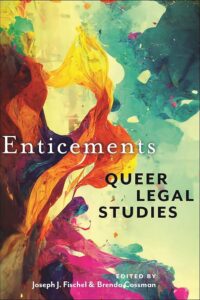
Enticements: Queer Legal Studies
NYU Press, March 2024
This book expands and expounds on the discipline of queer legal studies. Contributors focus on a wide range of sex/gender regulatory regimes, interrogating the use and abuse of queer history for impact litigation and social change, colonial and postcolonial sex laws otherwise obscured by the modern LGBT paradigm of sexual identity, and the policing of trans and cis men. Moving beyond a focus on LGBT identities, contributors consider limits to reproductive freedom, the Christianization of social justice movements, and the politicization of care within and across Black and feminist studies.
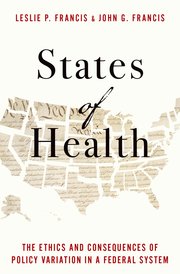
States of Health
Oxford University Press, May 2024
This book identifies the practical relevance of federalism to people facing ethical decisions about health and health care, and it considers the theoretical justifications for permissible differences among states. It asks whether authority over important aspects of health is misaligned in the United States today, with some matters problematically left to the states while others are taken over by the federal government. Health care is a basic good, central to the ability of people to flourish. If state policies result in a landscape where residents of some states can flourish in ways that residents of other states cannot, the mutuality of a federal union might be threatened. States of Health reminds us that there are some divisions that a nation cannot endure.
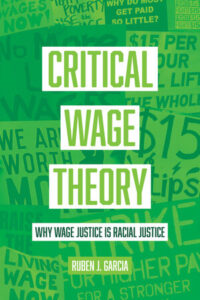
Critical Wage Theory
University of California Press, July 2024
This book argues forcefully that we must center the minimum wage as a tool for fighting structural racism. Employing the lessons of critical race theory to show how low minimum wages and underenforcement of workplace laws have always been features of our racially stratified society, Garcia explains why we must follow the leadership of social movements by treating increases in minimum wage levels and enforcement as matters of racial justice. Offering solutions that would benefit all workers, especially the immigrants and people of color most often made victims of wage theft, Critical Wage Theory is essential reading for anyone who seeks a more just future for the working class.
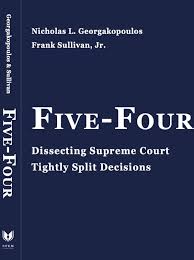
Five-Four: Dissecting Supreme Court Tightly Split Decisions
STEM Academic Press, 2024
This book develops new techniques to see the work of supreme courts, work characterized by much greater complexity than that seen either by the usual lawyers’ focus on one topic’s current law or popular and media focus of left versus right. For example, the book measures the “fluidity” of the voting coalitions in tightly split decisions of various supreme court compositions. The book presents (including in enclosed fold-out posters) visualizations showing the vastly complex oppositional geometry of tightly split decisions. And the book offers some interesting applications of these techniques.
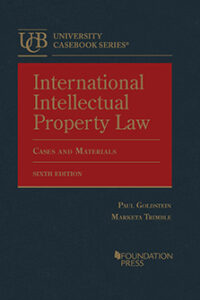
International Intellectual Property Law, Cases and Materials
Foundation Press, 2024
This casebook organizes contemporary foreign, as well as U.S., case law and literature to equip law students with the knowledge they need to practice intellectual property law in both transactional and litigation settings in the current globalized environment. Carefully selected materials also expose students to the social, economic, and cultural considerations that underpin intellectual property law around the world. The casebook covers aspects of public international law, conflict of laws (private international law), and comparative law of intellectual property. Each area of law―copyright, patent, trademark, unfair competition, trade secrets, and industrial design―is introduced by a comprehensive authors’ note placing the field in its international and comparative law context, and extensive notes on the cases and materials fill in relevant details, including current and historically important topics.
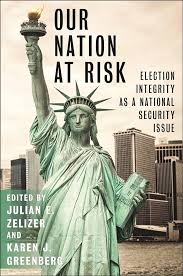
Our Nation at Risk: Election Integrity as a National Security Issue
NYU Press, July 2024
In recent years, the sight of gun-wielding citizens patrolling ballot boxes and voting sites has become increasingly familiar. Major news corporations parroting false claims of election fraud, ballot stuffing, and faulty voting systems as the new normal. In an era of global anti-democratic movements, the sanctity of democratic electoral processes has become a major national security concern, and the need to protect elections from foreign interference, disinformation, voter intimidation, and the danger of election results being overturned, are now front and center. How did we get here? And more importantly, how will this affect the future of democracy?
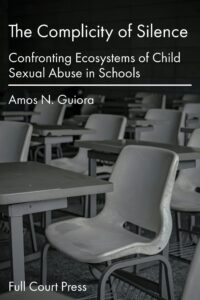
The Complicity of Silence: Confronting Ecosystems of Child Sexual Abuse in Schools
Full Court Press, June 2024
In November 1997 twelve-year-old Jeremy Bell was killed at the hands of Edgar W. Friedrichs, a serial pedophile, teacher, and later principal, who taught for decades at Pennsylvania and West Virginia schools despite extensive complaints submitted to school administrators. As an expert in the power systems that allow the worst criminal behavior to fester unobstructed, Guiora uses the specific facts of the Bell case to demonstrate how a network of enablers and bystanders “passing the trash” allowed a proven predator to remain free and access children at several schools from 1975 to 2001, while advocating for the broader policy changes and social safeguards that are necessary to prevent such disasters from occurring in the future.
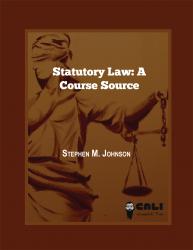
Statutory Law: A Course Source
eLangdell Press, 2024
Unlike traditional casebooks or coursebooks, a “course source” includes resources to train students in all three apprenticeships identified by the Carnegie Foundation in its influential report on legal education, Educating Lawyers: Preparation for the Profession of Law. To address the knowledge apprenticeship, the Statutory Law Course Source includes all of the traditional elements of a casebook or coursebook (cases, commentary, notes, and questions) and includes several hypotheticals and problem exercises that focus on reinforcing statutory law and developing students’ analytical and writing skills. In addition, as one of the many forms of summative and formative assessment included in the book, every chapter includes one or more CALI exercises as “quizzes” to reinforce the material covered in the chapter. To address the skills apprenticeship, the Statutory Law Course Source includes several legal research exercises (focusing on finding statutes, analyzing statutory structure, and understanding the notice and comment rulemaking process) and drafting exercises in addition to the hypotheticals and problem exercises described above. To address the values apprenticeship, the Statutory Law Course Source includes several professional identity formation exercises.
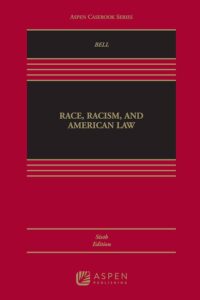
Geeta N. Kapur Race, Law, and the Struggle for Racial Equality in the U.S., First Edition
Aspen Publishing, February 2024
This book examines how the American legal system has legitimized and institutionalized racism, from slavery to Jim Crow segregation to the modern-day era of mass incarceration. This book, the first of its kind, has evolved from the author’s own experiences of both teaching race and the law for many years and practicing Civil Rights Law for over two decades. The text employs a novel interdisciplinary approach through primary source materials; archival records, photographs, and maps; and statutes and cases, to show how the judicial, executive, and legislative branches of the U.S. have deployed the law for racial control and to foster systemic racism in the areas of education, property and housing, criminal system, and voting rights.
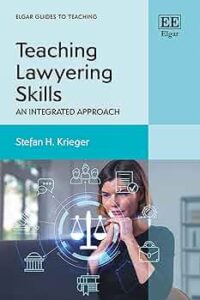
Stefan H. Krieger Teaching Lawyering Skills
Edward Elgar Publishing, May 2024
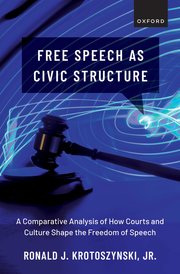
Free Speech as Civic Structure
Oxford University Press, July 2024
This book challenges the widely-held assumption that fundamental rights require a text in order to be judicially protected – both in the U.S. and in the wider democratic world. It establishes that local legal culture and institutional structure play a far more important role in the development and enforcement of free speech rules across domestic legal systems.
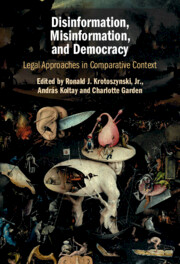
In today’s digital age, the spread of dis- and misinformation across traditional and social media poses a significant threat to democracy. Yet repressing political speech in the name of truth can also undermine democratic values. This volume brings together prominent legal scholars from democracies worldwide to explore and evaluate different regulatory approaches for addressing this complex problem – all taking into account that the cure must not be worse than the disease. Using a comparative lens, the book offers important and novel insights into methods ranging from national regulation of politicians’ speech to empowering civil-society groups that are well-positioned to blunt the effects of disinformation and misinformation.
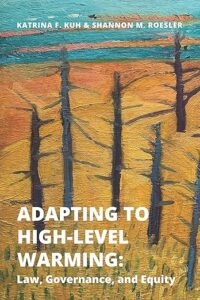
The contributors to this book, the fifth in a series by the Environmental Law Collaborative, have taken up the challenge of thinking about law, governance, equity, and justice in a future shaped by high levels of warming. It begins by identifying and offering solutions to address the mismatch between today’s legal and regulatory systems and the conditions and demands of high-level warming. The next set of chapters imagine more broadly the challenges of effective governance—across a range of laws, through democratic processes—under high-level warming. The book’s concluding chapters focus on equity and justice.
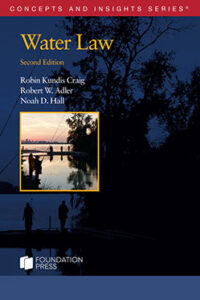
Robin Kundis Craig (University of Kansas School of Law), Robert W. Adler (University of Utah College of the Law), Noah D. Hall (Wayne State University Law School)
Water Law 2nd Edition
Intended for a general audience, Water Law: Concepts & Insights provides both a general overview of basic water law doctrines and an exploration of how water law—the law and policies governing allocation of water—fit into broader ecological and environmental law issues. The book provides an overview of important hydrological principles before discussing the major state-law systems governing use of water in the United States—riparian law, prior appropriation, and specific groundwater doctrines. It then explores the federal government’s interests in the fresh waters of the United States, ranging from protection of navigability to water infrastructure projects to reserved federal water rights.
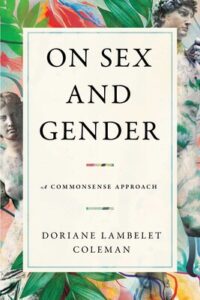
Simon & Schuster, 2024
This book focuses on three sequential and consequential questions: What is sex as opposed to gender? How does sex matter in our everyday lives? And how should it be reflected in law and policy? All three have been front-and-center in American life and politics since the rise of the trans rights movement: They are included in both major parties’ political platforms. They are the subject of ongoing litigation in the federal courts and of highly contentious legislation on Capitol Hill. And they are a pivotal issue in the culture wars between left and right playing out around dinner tables, on campuses and school boards, on op-ed pages, and in corporate handbooks.
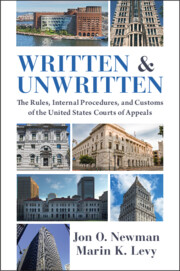
Cambridge University Press, 2024
Although the thirteen United States Courts of Appeals are the final word on 99 percent of all federal cases, there is no detailed account of how these courts operate. How do judges decide which decisions are binding precedents and which are not? Who decides whether appeals are argued orally? What administrative structures do these Courts have? The answers to these and hundreds of other questions are largely unknown, not only to lawyers and legal academics, but by many within the judiciary itself. Written and Unwritten is the first book to provide an inside look at how these courts operate. An unprecedented contribution to the field of judicial administration, the book collects the differing local rules and internal procedures of each Court of Appeals. In-depth interviews of the Chief Judges of all thirteen circuits and surveys of all Clerks of Court reveal previously undisclosed practices and customs.
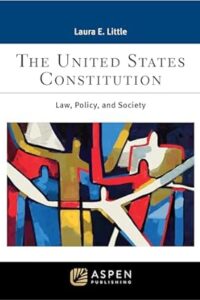
Laura E. Little Aspen Publishing, March 2024
This book presents an original and accessible take on Constitutional Law for undergraduates. While covering classic topics and themes such as federalism, individual rights, and separation of powers, the book does so with a focus on the topics central to U.S. citizens’ lives—topics such as gun rights; freedom of expression and social media; hate speech; reproductive rights; decisions that reinforced or challenged existing racial, class, ethnic, and gender stratifications; as well as the interplay between popular culture and the Supreme Court.
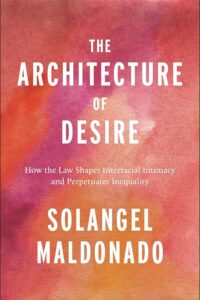
Solangel Maldonado , May 2024
This book examines how the law influences our most personal and private choices—who we desire and choose as intimate partners—and explores the psychological, economic, and social effects of these choices. Romantic preferences, as shaped by law, perpetuate segregation and subordination by limiting, on the basis of race, individuals’ prospects for marriage and marriage-like commitments, as well as economic and social mobility.
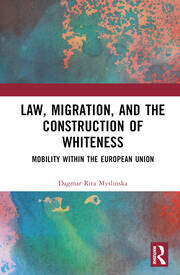
Dagmar Rita Myslinska Routledge, March 2024
Brexit supporters’ frequent targeting of European Union (EU) movers, especially those from Central and Eastern Europe, has been popularly assumed as at odds with the EU project’s foundations based on equality and inclusion. This book dispels that notion. By interrogating the history, wording, omissions, assumptions and applications of laws, policies and discourses pertinent to mobility and equality, the argument developed throughout the book is that the parameters of CEE nationals’ status within the EU have been closely circumscribed, in line with the entrenched historical positioning of the west as superior to the east.
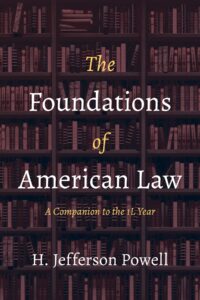
The main objective of this text is to introduce the reader to many of the background assumptions about American law and legal argument that inform how lawyers and judges read decisions and other legal documents, and how they think about legal problems. Lawyers presuppose and use these ideas and intellectual tools without discussing them, while law professors (and the materials they assign) often leave it to students to figure out the assumptions for themselves. The book discusses the relationship between logic and historical experience in the construction of the law, the ways pre-Revolutionary English common law shaped American law, and the 19th and early 20th century developments that led to contemporary American law.
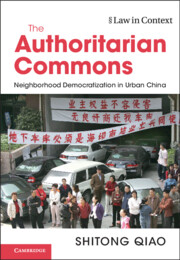
Based on six-year fieldwork across China including over 200 in-depth interviews, this book provides an ethnographic account of how hundreds of millions of Chinese homeowners practice democracy in and beyond their condominium complexes. Using interviews, survey data, and a comprehensive examination of laws, policies and judicial decisions, this book also examines how the party-state in China responds to the risks and benefits brought by neighborhood democratization. Moreover, this book provides a framework to analyze different approaches to the authoritarian dilemma facing neighborhood democratization which may increase the regime’s legitimacy and expose it to the challenge of independent organizations at the same time. Lastly, this book identifies conditions under which neighborhood democratization can succeed.
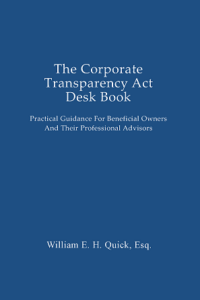
The Corporate Transparency Act requires certain corporations, limited liability companies, limited partnerships, statutory trusts and other similar entities (including both privately held and non-profit business entities), designated as reporting companies, to report their direct and indirect natural person beneficial ownership information to the Financial Crimes Enforcement Network within the U.S. Department of Treasury. Certain categories of entity attributes are expressly exempted from the CTA’s reporting requirements, but the vast majority of businesses operating in the U.S. are not so exempted. FinCEN estimated over 37 million reporting companies would be required to report in the first compliance year alone.
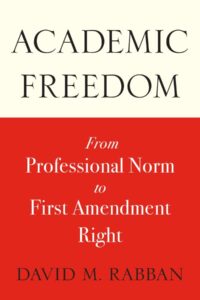
In subsuming academic freedom under the First Amendment, Rabban emphasizes the societal value of the contribution to knowledge made by the expert speech of professors, the classic justification for academic freedom in the influential 1915 Declaration of the American Association of University Professors (AAUP). Any indication that professors might be disciplined because people without academic training disagree with their scholarly views would undermine confidence in the integrity of their work and therefore their ability to perform this vital function on behalf of the public. Rabban argues that academic freedom fosters two central First Amendment values recognized by courts in a wide range of contexts: the production and dissemination of knowledge and the contribution of free expression to democratic citizenship.
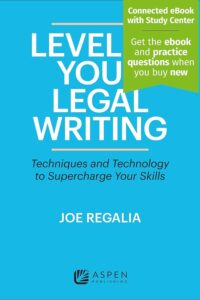
Grounded in a decade of research, these tools have been used successfully used by author Joe Regalia, as a founder of Write.law, to train students, lawyers, and judges in leveling up their writing style, developing their own authentic voice, connecting with their reader, leveraging technology, and learning to enjoy the writing process once again–or for the first time. A forward-thinking, integrated approach to the role of technology prepares you to thrive in today’s rapidly evolving, high-tech legal landscape.
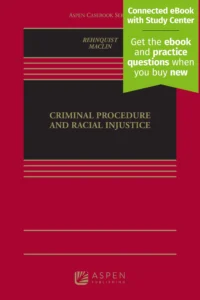
This book brings a sustained emphasis on race to the traditional content of criminal procedure. Rather than a wholesale revision of the standard criminal procedure fare, it amply covers all the familiar subject matter areas while integrating into those topics the roles that racial prejudice and racial disparities have played and continue to play in the criminal justice system.
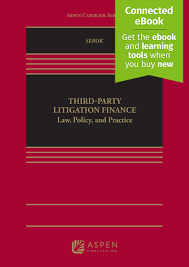
Litigation finance sits at the intersection of many well-known subjects within the law school curriculum: contracts, torts, civil procedure, evidence, professional responsibility, insurance, and capital markets. There are no professionally produced materials for a professor who wants to teach an entire semester-long course on litigation finance. This casebook is an attempt to fill that gap.
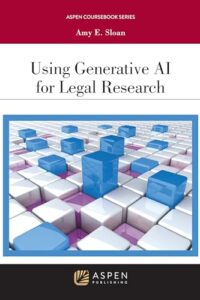
The promise of generative AI is awe-inspiring. Today, however, the questions about generative AI sometimes outnumber the answers. Using Generative AI for Legal Research provides a framework professors can use to introduce generative AI into the research curriculum. To use generative AI effectively, researchers must be aware both of its potential and its limitations. Using Generative AI for Legal Research explores how generative AI fits within a process for conducting legal research.

Shackled: 92 Refugees Imprisoned on ICE Air
University of California Press, January 2024
In December 2017, U.S. immigration authorities shackled and abused 92 African refugees for two days while attempting to deport them by plane to Somalia. When national media broke the story, government officials lied about what happened. Shackled tells the story of this harrowing failed deportation, the resulting class action litigation, and two men’s search for safety in the United States over the course of three long years.
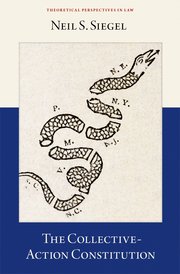
The Collective-Action Constitution
Oxford University Press, April 2024
An important read for scholars, lawyers, judges, and students alike, Neil Siegel’s The Collective-Action Constitution addresses how the U.S. Constitution is, in a fundamental sense, the Collective-Action Constitution. Any faithful account of what the Constitution is for and how it should be interpreted must include the primary structural purpose of empowering the federal government to solve collective-action problems for the states and preventing them from causing such problems.
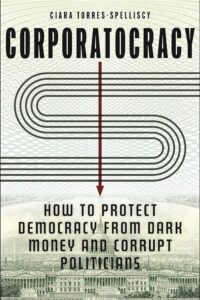
Corporatocracy
NYU Press, November 2024
In this book, the author reveals the role corporations play in this dire state of political affairs, and explains why and how they should be held accountable by the courts, their shareholders, and citizens themselves. Drawing on key Supreme Court cases, Torres-Spelliscy explores how corporations have, more often than not, been on the wrong side of history by working to undermine democratic norms, practices, and laws. From bankrolling regressive politicians to funding ghost candidates with dark money, she shows us how corporations subvert the will of the American people, and how courts struggle to hold them and corrupt politicians accountable.
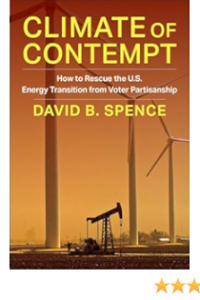
Climate of Contempt
Columbia University Press, August 2024
This book offers a voter-centric, bottom-up explanation of national climate and energy politics, one that pinpoints bitter partisanship as the key impediment to transitioning to a net zero carbon future. Members of Congress respond to voters whose animosity toward the opposing party makes compromise politically risky. The most powerful driver of polarization, in turn, is the mixture of ideology and social media that constitutes today’s information environment, which amplifies anger, spreads half truths and falsehoods, and sows division, distorting voters’ understandings of the energy transition and their fellow citizens.
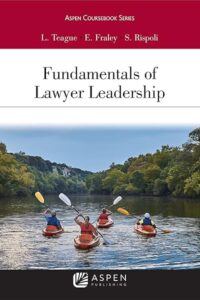
Fundamentals of Lawyer Leadership: A Skills Guide to Professional Identity Formation, Second Edition
Aspen Publishing, September 2024
In this book, the authors explore the aspects of leadership and professional identity formation that take root and begin to grow while students are in law school and throughout their lifelong journey as practicing attorneys and professionals. They describe professional identity and its formation as the process of becoming a complete lawyer; however, honing the skill sets of a complete lawyer takes time and study. Just as developing legal skills is a life-long endeavor, growing as a leader is a process that evolves over a lifetime.
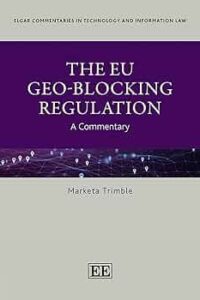
The EU Geo-Blocking Regulation
Edward Elgar Publishing, 2024
This Commentary analyses the history, technology, uses, legality, and circumvention of geo-blocking, which affects customers and businesses both inside and outside the EU. Marketa Trimble examines each of the provisions of the 2018 EU Geo-Blocking Regulation, including provisions on non-discriminatory access to online interfaces, goods and services, and means of payment.
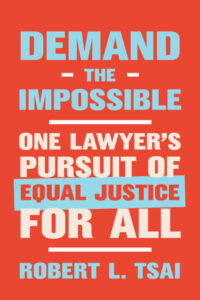
Demand the Impossible: One Lawyer’s Pursuit of Equal Justice for All
W.W. Norton & Company, 2024
Robert L. Tsai traces Stephen Bright’s remarkable career to explore the legal ideas that were central to his relentless pursuit of equal justice. For nearly forty years, Bright led the Southern Center for Human Rights, a nonprofit that provided legal aid to incarcerated people and worked to improve conditions within the justice system. He argued four capital cases before the US Supreme Court—and won each one, despite facing an increasingly hostile bench.
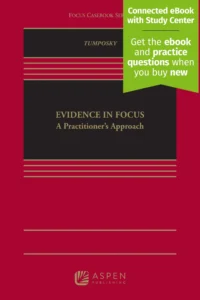
Evidence in Focus: A Practitioner’s Approach, First Edition
Aspen Publishing, September 2024
This book teaches the Federal Rules from a practicing lawyer’s perspective, illustrates their role within the context of litigation, and gives due consideration to how judges apply the rules in reaching a decision. Fascinating cases narrate the trials of intriguing characters and breathe life into legal theory. Approachable writing, clear explanations, and real-world hypothetical problems enliven class discussion and develop students’ critical thinking skills. Humor, references to popular culture, and links to audio or video clips keep students engaged in learning the Rules of Evidence.
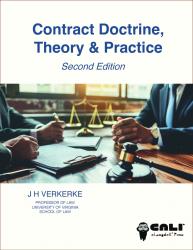
Contract Doctrine, Theory & Practice
eLangdell Press, 2024
This casebook, along with the accompanying volume of principal cases, introduces students to the law of contracts. It covers enough core common law concepts to offer a rich four-credit first-year course including a selection of UCC topics that will enrich students’ understanding of courts’ doctrinal choices. The first semester of law school is mostly about learning to speak a new legal language (but emphatically not “legalese”), to formulate and evaluate legal arguments, and to become comfortable with the distinctive style of legal analysis. We could teach these skills using almost any legal topic. But we begin the first-year curriculum with subjects that pervade the entire field of law.
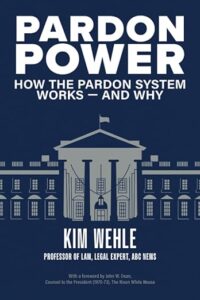
Pardon Power: How The Pardon System Works—And Why
Woodhall Press, September 2024
The president’s power to pardon federal crimes is immense, with roots in ancient notions of mercy and amnesty. However, this power, seemingly boundless under the Constitution, lacks clear constraints, inviting concerns about abuse. In this book, the author explores the historical context and contemporary challenges surrounding the presidential pardon. Wehle contends that any pardon undermining the principle of accountability before the law, including self-pardons, cannot be constitutionally justified. Urgent recognition of the necessity for guardrails around the pardon power is essential to safeguard American democracy.
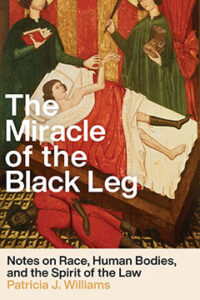
The Miracle of the Black Leg
The New Press, 2024
Beginning with a jaw-dropping rumination on a centuries-old painting featuring a white man with a Black man’s leg surgically attached (with the expired Black leg-donor in the foreground), contracts law scholar and celebrated journalist Patricia J. Williams uses the lens of the law to take on core questions of identity, ethics, and race. With her trademark elegant prose and critical legal studies wisdom, Williams brings to bear a keen analytic eye and a lawyer’s training to chapters exploring the ways we have legislated the ownership of everything from body parts to gene sequences—and the particular ways in which our laws in these areas isolate nonnormative looks, minority cultures, and out-of-the-box thinkers.

You’ll Do: A History of Marrying for Reasons Other Than Love
Steerforth Press, January 2024
Laws have been designed to encourage people to marry so that certain societal benefits could be achieved: the population would increase, women would have financial security, children would be cared for, and immigrants would have familial connections. The widely overlooked problem with this tradition is that individuals and society have relied on marriage to address or dismiss a range of injustices and inequities, from gender- and race-based discrimination, sexual violence, and predation to unequal financial treatment. Through revealing storytelling, Zug builds a compelling case that when marriage is touted as “the solution” to such problems, it absolves the government, and society, of the responsibility for directly addressing them.
Faculty Books Published in 2023
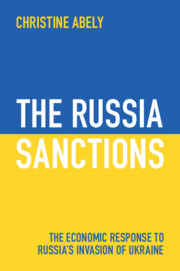
New England Law Boston)
The Russia Sanctions: The Economic Response to Russia’s Invasion of Ukraine
Cambridge University Press, December 2023
This book examines the international trade measures and sanctions deployed against Russia in response to its 2022 invasion of Ukraine. Abely situates contemporary sanctions within their larger historical and economic backgrounds and provides a uniquely accessible analysis of the historic export controls and import restrictions enacted since 2022. She argues that these sanctions have affected, and will continue to affect, global trading patterns, financial integration, and foreign policy in novel ways. In particular, she examines the effects of sanctions on energy, food, fertilizer, the financial system, and the global use of the US dollar, including trends of de-dollarization. Coverage includes sanctions against oligarchs, the freezing and seizure of assets, and steps taken to make sanctions more effective by promoting financial transparency worldwide.
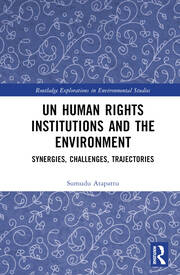
Sumudu Atapattu (University of Wisconsin Law School)
UN Human Rights Institutions and the Environment: Synergies, Challenges, Trajectories
Routledge, May 2023
Despite the increasing involvement of UN human rights bodies in addressing environmental degradation and climate change, a systematic review of the convergence between human rights and the environment in these bodies has not been carried out. Filing this lacuna, this book surveys the resolutions, general comments, concluding observations, decisions on individual communications and press releases. It identifies principles that have emerged, explores the ways in which human rights charter-based and treaty-based institutions are interpreting environmental principles and examines how they contribute to the emerging field of human rights and the environment. Given the disproportionate effect that polluting activities have on marginalized and vulnerable groups, Atapattu also discusses how these human rights mechanisms have addressed the impact on women, children, indigenous peoples, people with disabilities, and racial minorities.
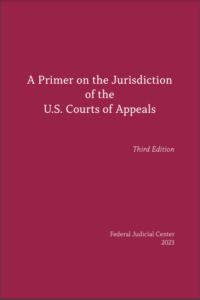
Thomas E. Baker (Florida International University College of Law)
A Primer on the Jurisdiction of the U.S. Courts of Appeals, 3d ed.
Federal Judicial Center, August 2023
This primer is a brief introduction to the complexity and nuance in the subject-matter jurisdiction of the U.S. courts of appeals. It examines procedural issues related to the exercise of appellate jurisdiction in appeals from final judgments and interlocutory appeals.
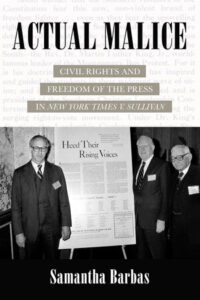
Samantha Barbas (University at Buffalo School of Law)
Actual Malice: Civil Rights and Freedom of the Press in New York Times v. Sullivan
University of California Press, February 2023
A deeply researched legal drama that documents this landmark First Amendment ruling—one that is more critical and controversial than ever. Actual Malice tells the full story of New York Times v. Sullivan, the dramatic case that grew out of segregationists’ attempts to quash reporting on the civil rights movement. In its landmark 1964 decision, the Supreme Court held that a public official must prove “actual malice” or reckless disregard of the truth to win a libel lawsuit, providing critical protections for free speech and freedom of the press. Drawing on previously unexplored sources, including the archives of the New York Times Company and civil rights leaders, Samantha Barbas tracks the saga behind one of the most important First Amendment rulings in history. She situates the case within the turbulent 1960s and the history of the press, alongside striking portraits of the lawyers, officials, judges, activists, editors, and journalists who brought and defended the case. As the Sullivan doctrine faces growing controversy, Actual Malice reminds us of the stakes of the case that shaped American reporting and public discourse as we know it.
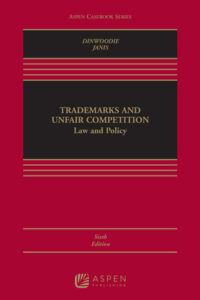
Katharine T. Bartlett (Duke Law School) Deborah L. Rhodes (Stanford Law School) Deborah L. Blake (University of Pittsburgh) Frank Rudy Cooper (William S. Boyd School of Law at UNLV)
Gender and Law: Theory, Doctrine, Commentary
Aspen Publishing, February 2023
Gender and Law: Theory, Doctrine, Commentary, Ninth Edition is organized around theoretical frameworks, showing different conceptualizations of equality and justice and their impact on concrete legal problems. The text provides complete, up-to-date coverage of conventional “women and the law” issues, including employment law and affirmative action, reproductive rights, LGBTQ issues, domestic violence, rape, pornography, international women’s rights, and global trafficking. Showing the complex ways in which gender permeates the law, the text also explores the gender aspects of subject matters less commonly associated with gender, such as property, ethics, contracts, sports, and civil procedure. Throughout, the materials allow an emphasis on alternative approaches and how these approaches make a difference. Excerpted legal cases, statutes, and law review articles form an ongoing dialogue within the book to stimulate thought and discussion, and almost 250 provocative “putting theory into practice” problems challenge students to think deeply about current gender law issues.
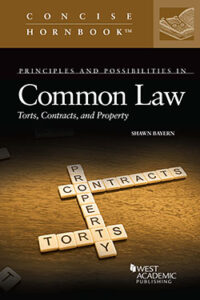
Shawn Bayern (Florida State University College of Law)
Bayern’s Principles and Possibilities in Common Law: Torts, Contracts, and Property
West Academic Publishing, July 2023
This book discusses principles of the common law, with attention to how the subjects of tort law, contract law, and property law have developed in the United States. The focus is on modern law and how it has changed from more formalistic rules that were used in the past. It is an ideal introductory guide for law students and others interested in modern legal reasoning. The book pays special attention to parallels and correspondences between its legal subject areas, showing how they fit together into a larger picture. While teaching the material at a sophisticated level and avoiding “tips” and “tricks,” the book includes notes on what to focus on when learning the common law and includes a significant amount of material that shows the subtleties of modern legal education.
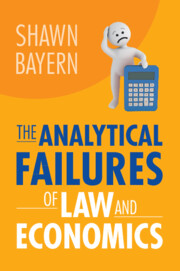
Shawn Bayern (Florida State University College of Law)
The Analytical Failures of Law and Economics
Cambridge University Press, September 2023
The law-and-economics movement remains a dominant force in American private law, even though courts and commentators recognize that many of its assumptions are implausible and that efficiency is not the law’s only goal. This book adds to the debate by showing that many leading law-and-economics arguments fail on their own terms, even for those who accept their most important assumptions and goals. Adopting an analytical approach and using some law-and-economics methods against the leading arguments in that field, Shawn Bayern shows that economic thinking fails to explain or justify most rules in the common law. Bayern masterfully surveys leading law-and-economics arguments in tort, contract, and property law and shows them to be fragile, self-contradictory, or otherwise problematic. Those who accept that efficiency is important should not be persuaded by the kind of law-and-economics arguments that have remained in vogue among legal scholars for decades.
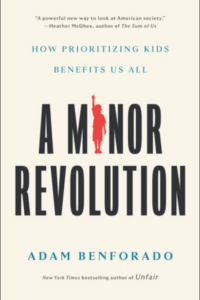
Adam Benforado (Drexel University Thomas R. Kline School of Law)
A Minor Revolution: How Prioritizing Kids Benefits Us All
Crown, February 2023
At the dawn of the twentieth century, a bright new age for children appeared on the horizon, with progress on ending child labor, providing public education, combating indigence, promoting wellness, and creating a juvenile justice system. But a hundred years on, the promised light has not arrived. Today, more than eleven million American children live in poverty and more than four million lack health insurance. Each year, we prosecute thousands of kids as adults, while our schools crumble. We deny young people any political power, while we fail to act on the issues that matter most to them: racism, inequality, and climate change. Drawing on the latest research on the value of early intervention, investment, and empowerment, A Minor Revolution makes the urgent case for putting children first—in our budgets and policies, in how we develop products and enact laws, and in our families and communities. Childhood is the window of opportunity for all of us.
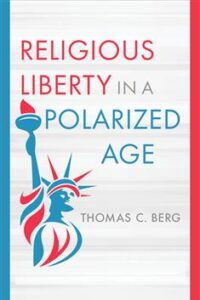
Thomas C. Berg (University of St. Thomas, Minnesota)
Religious Liberty in a Polarized Age
Wm. B. Eerdmans Publishing Co., 2023
As our political and social landscapes polarize along party lines, religious liberty faces threats from both sides. From antidiscrimination commissions targeting conservative Christians to travel bans punishing Muslims, recent litigation has revealed the selective approach both left and right take when it comes to freedom of religion. But what if religious liberty is part of the cure for our political division? Drawing on constitutional law, history, and sociology, Thomas C. Berg shows us how reaffirming religious freedom cultivates the good of individuals and society. After explaining the features of polarization and the societal benefits of diverse religious practices, Berg offers practical counsel on balancing religious freedom against other essential values. Protecting Americans’ ability to live according to their beliefs undergirds a healthy, pluralistic society—and this protection must extend to everyone, not just political allies. Lay readers and legal scholars who are weary of partisan quarreling will find Berg’s case timely and compelling.
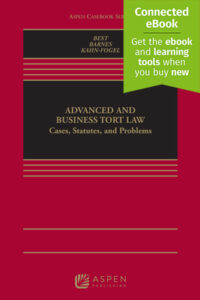
Arthur Best (University of Denver, Sturm College of Law), David W. Barnes (Seton Hall Law School), Nicholas Kahn-Fogel (Penn State Dickinson Law)
Advanced and Business Tort Law: Cases, Statutes, and Problems
Aspen Publishing, September 2023
Advanced and Business Tort Law is designed for advanced torts classes with a detailed treatment of dignitary and personal economic torts or business and unfair competition torts or a summary treatment of both. Unlike other casebooks, Advanced and Business Tort Law is ideal for any of the common combinations of the subject matter discussed in upper-level torts classes. The authors’ approach emphasizes the elements of each tort and the policies underlying the tort doctrines.
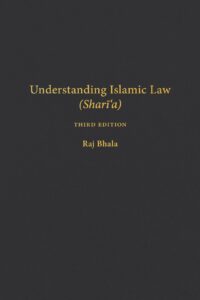
Understanding Islamic Law
Carolina Academic Press, 2023
This critically-acclaimed treatise provides both newcomers and experts with clear, accessible, and comprehensive materials and critical comparative analyses for the study of Islamic Law. It embraces the entire history, religion, and law of Islam, both Sunni and Shī’a, and covers all pertinent fields: banking and finance, constitutional law, contracts, criminal law, family law, inheritance, international law, and property. The book includes a user-friendly glossary of Arabic terms, in English, with diacritical marks to assist in pronunciation.
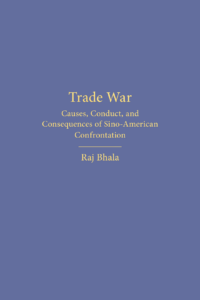
Trade War: Causes, Conduct, and Consequences of Sino-American Confrontation
Carolina Academic Press, 2023
This book is the world’s first full-length legal and interdisciplinary analysis of the U.S.-China trade war. It is the result of five years of research, dating back to the start of the trade war in March 2018. All of the big-picture themes and trends, and vital technical details, are explained with clarity and precision. The twenty-two chapters are logically organized into three parts, proceeding chronologically through tariff, non-tariff, and future battles. Trade-related matters, including industrial policy, human rights, Hong Kong, and “Cold War” characterizations, are amply discussed. Special care is taken to understand the perspectives of China, as well as those of major third countries such as India. The book has a user-friendly table of abbreviations, plus copious citations for further reading.
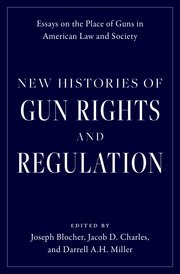
Joseph Blocher (Duke Law School), Jacob D. Charles (Pepperdine Caruso School of Law), Darrell A. H. Miller (Duke Law School)
New Histories of Gun Rights and Regulation
Oxford University Press, October 2023
Drawing on original research and sources not available to earlier Supreme Court opinions, New Histories of Gun Rights and Regulations brings together various methodological approaches and highlights issues in firearms law that have been previously underexamined. Its contributors, including distinguished historians, social scientists, and legal scholars, offer valuable new insight into the place of guns in American law and society. This groundbreaking new volume illuminates how history and constitutional law interact, suggesting concrete answers to some live legal controversies.
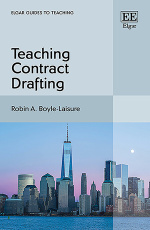
Robin A. Boyle-Laisure (St. John’s University School of Law)
Teaching Contract Drafting
Edward Elgar Publishing, 2023
This comprehensive guide covers every stage of organising and teaching a course in contract drafting. With extensive sample course materials, it offers useful tips for building nuance, creative thinking, and experiential learning into contract drafting curricula. Chapters give detailed definitions and examples of core contract concepts including representations and warranties; covenants; conditions; discretionary authority; and declarations.
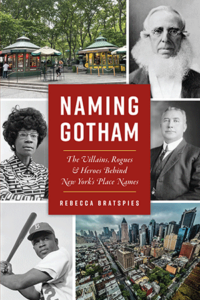
Rebecca Bratspies (CUNY Law)
Naming Gotham: The Villains, Rogues, and Heroes Behind New York Place Names
History Press, January 2023
New York’s many roads, bridges, tunnels, neighborhoods and institutions bear the names of a diverse cast of characters. The Kosciuszko Bridge honors Tadeusz Kosciuszko, a Polish American Revolutionary War hero and fervent abolitionist. The Outerbridge Crossing, named after the Port Authority’s first chairman, Eugenius Outerbridge, is called a crossing because Outerbridge Bridge sounded absurd. Shirley Chisholm State Park celebrates the first Black woman elected to Congress, the larger-than-life Shirley Chisholm. Clifford Holland originally designed his tunnel under the Hudson River to accommodate horse carts. These place names embody the rich history of the city that never sleeps, yet few know their true stories. Author Rebecca Bratspies uncovers the vibrant personalities behind the names that have become New York’s urban shorthand for traffic jams, culture and recreation.
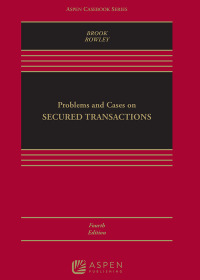
Problems and Cases on Secured Transactions, Fourth Edition
Aspen Publishing, September 2023
Using a problem-based approach, this book engages students with imaginative scenarios while providing an accessible and manageable approach to personal property secured transactions, without avoiding the intricacies of UCC Article 9 or de-emphasizing its interplay with other UCC articles, selected state non-UCC law, or federal bankruptcy law. Designed for a standalone Secured Transactions course, but adaptable to other configurations, the book presents UCC Article 9 as completely comprehensible, even enjoyable, rather than as arcana that only an insider can be expected to understand.
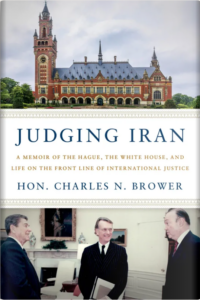
Hon. Charles N. Brower (George Washington University Law School)
Judging Iran: A Memoir of The Hague, The White House, and Life on the Front Line of International Justice
Disruption Books, April 2023
From a divided Berlin to The Hague, the Reagan White House, the forests of Costa Rica, and more, Judge Charles N. Brower shares a personal history of a life spent at the forefront of international justice — and a case for the role of law in preserving global peace.
Judging Iran is a frank insider account of the highest echelons of international law. As an active judge to this day, Brower offers a nuanced history of modern arbitration between nations, from our earliest concept of international law to today’s efforts for justice. And, as a global citizen, he argues that the law is essential in our work for peace.
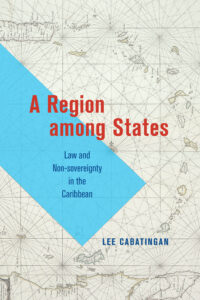
Lee Cabatingan (University of California, Irvine Law)
A Region among States: Law and Non-sovereignty in the Caribbean
University of Chicago Press, June 2023
How is it that a great swath of the independent, English-speaking Caribbean continues to accept the judicial oversight of their former colonizer via the British institution of the Privy Council? And what possibilities might the Caribbean Court of Justice—a judicial institution responsive to the region, not to any single nation—offer for untangling sovereignty and regionhood, law and modernity, and postcolonial Caribbean identity? Joining the Court as an intern, Lee Cabatingan studied its work up close: she attended each court hearing and numerous staff meetings, served on committees, assisted with the organization of conferences, and helped prepare speeches and presentations for the judges. She now offers insight into not only how the Court positions itself vis-à-vis the Caribbean region and the world but also whether the Court—and, perhaps, the region itself as an overarching construct—might ever achieve a real measure of popular success. In their quest for an accepting, eager constituency, the Court is undertaking a project of extrajudicial region building that borrows from the toolbox of the nation-state. In each chapter, Cabatingan takes us into an analytical dimension familiar from studies of nation and state building—myth, territory, people, language, and brand—to help us understand not only the Court and its ambitions but also the regionalist project, beset as it is with false starts and disappointments, as a potential alternative to the sovereign state.
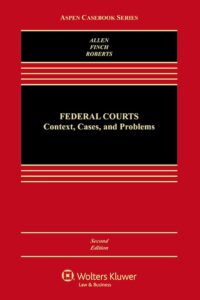
UC Berkeley School of Law), Seth Davis (UC Berkeley School of Law), Fred O. Smith (Emory University School of Law), Norman W. Spaulding (Stanford Law School)
Federal Courts in Context
Aspen Publishing, June 2023
Federal Courts deservedly have the reputation of being an exceptionally difficult course, and this book is designed to make it accessible to students by providing the context of cases and doctrines, as well as explaining their relevance to the issues being litigated in the 21st century. Federal Courts in Context supports what pedagogic research calls “deep learning.”
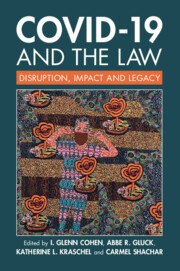
Harvard Law School), Yale University), Northeastern University School of Law), Harvard Law School)
COVID-19 and the Law: Disruption, Impact and Legacy
Cambridge University Press, 2023
The COVID-19 pandemic has had an enduring effect across the entire spectrum of law and policy, in areas ranging from health equity and racial justice, to constitutional law, the law of prisons, federal benefit programs, election law and much more. This collection provides a critical reflection on what changes the pandemic has already introduced, and what its legacy may be. Chapters evaluate how healthcare and government institutions have succeeded and failed during this global ‘stress test,’ and explore how the US and the world will move forward to ensure we are better prepared for future pandemics. This timely volume identifies the right questions to ask as we take stock of pandemic realities and provides guidance for the many stakeholders of COVID-19’s legal legacy.
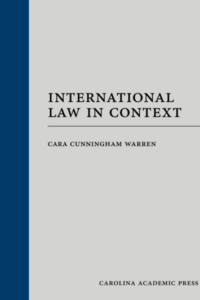
Cara Cunningham Warren (University of Detroit Mercy School of Law)
International Law in Context
Carolina Academic Press, 2023
This casebook reflects the recent paradigm shift in legal education, which asks the academy to focus on what students actually learn rather than the material to which they are exposed. To this end, the text organizes material into conceptual frameworks to promote understanding and retention. It also provides students with meaningful feedback loops via a series of pedagogical devices, such as foundation questions, assessment sets, and “Why Is This Important?” prompts that invite reflection and synthesis.
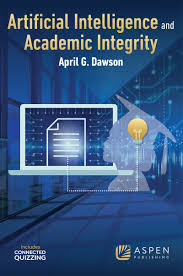
April G. Dawson (North Carolina Central University School of Law)
Artificial Intelligence and Academic Integrity
Aspen Publishing, August 2023
AI is having a sudden and profound impact on the legal profession, as it has in virtually professions worldwide. Understanding how to leverage AI tools effectively and appropriately will give law school graduates a competitive edge among legal employers interested to hire tech-savvy young lawyers. But AI is also having a profound impact on the legal education experience.
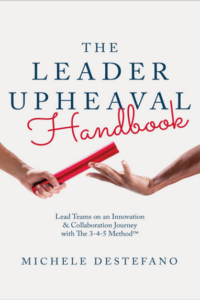
The Leader Upheaval Handbook
ABA Book Publishing, August 2023
One of the barriers to innovation in professional services is a lack of training in how to apply design thinking principles and lead multidisciplinary teams in collaborative problem solving. With this handbook, which accompanies her other books Leader Upheaval and Legal Upheaval, Professor Michele DeStefano attempts to fill in this training gap.
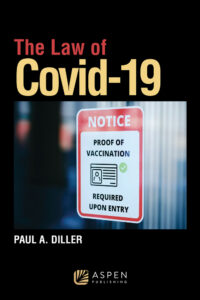
The Law of Covid-19
Aspen Publishing, September 2023
This textbook surveys the major legal issues emanating from the policy responses to Covid-19 in the United States, with an emphasis on federalism, administrative law, and state and local government. The Covid-19 pandemic led to unprecedented policy responses from the various levels and organs of government in the United States, as well as from private parties. Business, school, and church closures, mask mandates, employer and university vaccine mandates, vaccine passports to visit movie theaters and restaurants — this panoply of responses changed the world many of us lived in and led to widespread and hotly contested litigation in America’s federal and state courts.
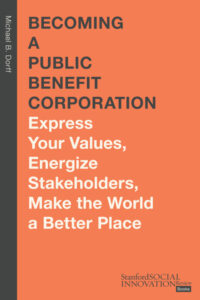
Becoming a Public Benefit Corporation: Express Your Values, Energize Stakeholders, Make the World a Better Place
Stanford University Press, November 2023
Entrepreneurs and leaders often have an inspiring vision for how their business can not only make money for shareholders, but also benefit society. In recent years a new legal structure has emerged, the “Benefit Corporation” or “Public Benefit Corporation,” which helps organizations make this ethical vision a legally authorized and protected reality. Companies like Patagonia, Kickstarter, Warby Parker, Danone North America, Allbirds, and King Arthur Baking have become benefit corporations to help advance both their business and their broader mission. Rather than narrowly maximizing profits, they consider their businesses’ impacts on employees, customers, suppliers, the environment and others.
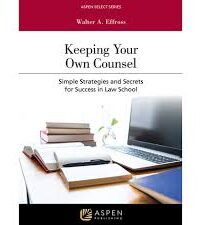
Keeping Your Own Counsel: Simple Strategies and Secrets for Success in Law School
Aspen Publishing, March 2023
Drawing on the author’s seven years of big-firm practice and quarter-century of full-time law teaching, the book provides encouraging and immediately-usable methods to support students throughout their law school careers, starting well before the first day of classes. Keeping Your Own Counsel includes structures for mastering information, maximizing efficiency, minimizing stress, and building a portfolio of publications.
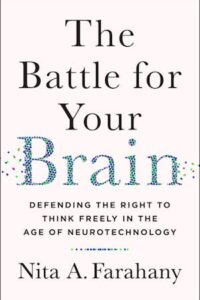
Nita A. Farahany (Duke University School of Law)
The Battle for Your Brain Defending the Right to Think Freely in the Age of Neurotechnology
St. Martin’s Press, March 2023
A new dawn of brain tracking and hacking is coming. Will you be prepared for what comes next? Imagine a world where your brain can be interrogated to learn your political beliefs, your thoughts can be used as evidence of a crime, and your own feelings can be held against you. A world where people who suffer from epilepsy receive alerts moments before a seizure, and the average person can peer into their own mind to eliminate painful memories or cure addictions. Neuroscience has already made all of this possible today, and neurotechnology will soon become the “universal controller” for all of our interactions with technology. This can benefit humanity immensely, but without safeguards, it can seriously threaten our fundamental human rights to privacy, freedom of thought, and self-determination. From one of the world’s foremost experts on the ethics of neuroscience, The Battle for Your Brain offers a path forward to navigate the complex legal and ethical dilemmas that will fundamentally impact our freedom to understand, shape, and define ourselves.
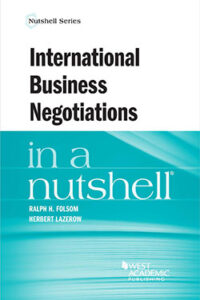
Ralph H. Folsom (University of San Diego School of Law), Herbert Lazerow (University of San Diego School of Law)
International Business Negotiations in a Nutshell
West Academic, 2023
This book is designed for legal, business, and international studies. It first explains why international business negotiations are strikingly different from domestic negotiations. This Nutshell introduces the basics of negotiating international business transactions, then moves to specific negotiations of international sales agreements, letters of credit, foreign sales agents and distributors, international franchise agreements, international technology transfer agreements, foreign investment agreements, fundamentals and negotiation of international dispute settlement, negotiating choice of forum and choice of law clauses, and finally negotiating exit clauses in international business agreements.

Daniel Gervais (Vanderbilt University Law School)
Forever
Anthem Press, August 2023
The idea of transferring humans into humanoid bodies has been the theme for many eminent titles. This book’s unique contribution is its exploration of the legal questions and embedded philosophical issues that flow from being able to transfer a copy of a person’s mind into a synthetic body that lives forever.
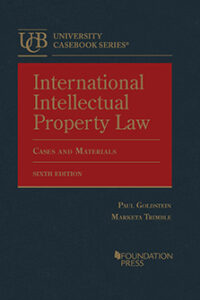
Paul Goldstein (Stanford Law School) Marketa Trimble (William S. Boyd School of Law)
International Intellectual Property Law Cases and Materials
Foundation Press, October 2023
This casebook organizes contemporary foreign, as well as U.S., case law and literature to equip law students with the knowledge they need to practice intellectual property law in both transactional and litigation settings in the current globalized environment. Carefully selected materials also expose students to the social, economic, and cultural considerations that underpin intellectual property law around the world. The casebook covers aspects of public international law, conflict of laws (private international law), and comparative law of intellectual property. Each area of law―copyright, patent, trademark, unfair competition, trade secrets, and industrial design―is introduced by a comprehensive authors’ note placing the field in its international and comparative law context, and extensive notes on the cases and materials fill in relevant details, including current and historically important topics. Materials on the major fields of intellectual property law are accompanied by materials on other related intellectual property matters, such as the protection of databases, plant varieties, geographical indications of origin, and internet domain names. A comprehensive teacher’s manual offers step-by-step assistance for teaching every case and doctrine, and also sample syllabi, final exams, learning outcomes and means of assessment.
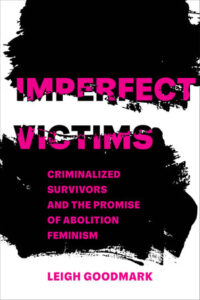
Leigh Goodmark (University of Maryland Francis King Carey School of Law)
Imperfect Victims: Criminalized Survivors and the Promise of Abolition Feminism
University of California Press, January 2023
Since the 1970s, anti-violence advocates have worked to make the legal system more responsive to gender-based violence. But greater state intervention in cases of intimate partner violence, rape, sexual assault, and trafficking has led to the arrest, prosecution, conviction, and incarceration of victims, particularly women of color and trans and gender-nonconforming people. Imperfect Victims argues that only dismantling the system will bring that punishment to an end.
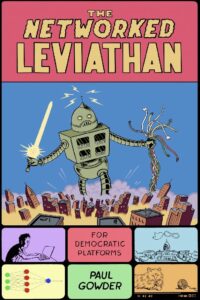
Paul A. Gowder (Northwestern University Pritzker School of Law)
The Networked Leviathan
Cambridge University Press, July 2023
We all—users, businesses, governments, and the general public—expect internet platform companies, like Meta, Alphabet, and Amazon to govern their users. Without platform governance, we all experience disasters like foreign election interference, vaccine misinformation, counterfeiting, and even genocide. Unfortunately, the platform companies have failed. To this day, despite the lessons from years of missteps and billions of dollars of spending in enterprises like content moderation, the major internet companies have been unable to prevent their platforms from hosting misinformation, scams, incitement, and hate. Nobody (except the perpetrators) wants this result. The failures of platform companies result not from mailce, but from companies’ inability to manage the complexity of their userbases and products and of their own incentives under the eyes of conflicting internal and external constituencies. The research of scholars in political science and other academic disciplines can help companies and governments progress on the problem of platform governance. Political scientists, constitutional theorists, and other scholars of governance have been studying the efforts of states to govern under complexity for centuries under theoretical rubrics like the problem of knowledge and incentive-compatible institutional design. The Networked Leviathan argues that this hard-won knowledge about states also applies to platforms. The insights from the research in political science and allied disciplines leads inexorably to the conclusion that governments and companies should collaborate to build democratic institutions for platform governance. By permitting ordinary people from across the world to participate in the governance enterprise, we allow those with the knowledge critical to making and applying platform rules to deploy that knowledge where it can make an impact. Democratic governance also allows companies to recruit third parties to help manage their own capacity to make and stick to decisions. The Networked Leviathan offers a case and a roadmap for democratizing the platforms.
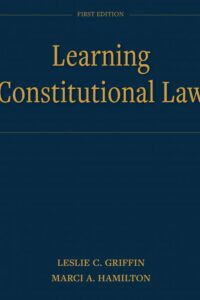
Leslie C. Griffin (William S. Boyd School of Law at UNLV) Marci A. Hamilton (University of Pennsylvania)
Learning Constitutional Law
Cognella, 2023
Learning Constitutional Law provides students with a comprehensive exploration of the core articles and amendments of the U.S. Constitution establishing the structure of the federal and state governments and select rights. Students learn how they are interpreted and applied, relevant history, and the arc of their development.
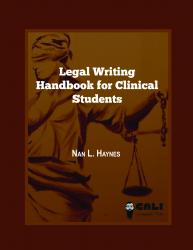
Nan L. Haynes (University at Buffalo School of Law)
Legal Writing Handbook for Clinical Students
eLangdell Press, 2023
This handbook is for upper-level students enrolled in a clinic, who are expected to draft legal memorandums, briefs, client letters, and pleadings with minimal supervision. Each chapter focuses on a single writing skill. The exercises and examples consistently and cogently employ the techniques and devices advocated in the book. Clinical students learn by doing. Still, their legal writing experience is limited, so guiding them through written assignments is challenging. They simultaneously need specific feedback on legal writing from their professors, and the opportunity to do as much as possible on their own.
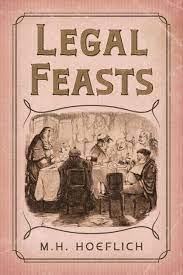
Legal Feasts
Talbot Publishing, 2023
In this book, the author discusses the history and significance of gatherings of lawyers to share food, wine, and conversation. Conviviality is a cornerstone of these gatherings. He includes sample menus with commentary and sample recipes of dishes listed in these menus. This volume should entertain and instruct every lawyer and person interested in the legal profession, the law, food, and social occasions.
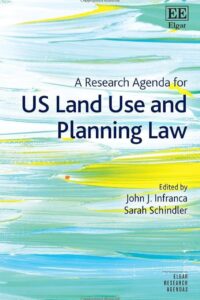
A Research Agenda for US Land Use and Planning Law
Edward Elgar Publishing, December 2023
Authoritative and multidisciplinary in approach, this Research Agenda shapes questions that will underpin future legal and empirical scholarly inquiry on zoning and land use regulation in the US. Building on existing debates and providing a comprehensive overview of the current state of academic research, it identifies the gaps which need addressing in future research. Bringing together a diverse array of prominent voices across multiple disciplines, this book adeptly navigates central themes including the structure of land use regulation, the relationship between zoning and planning, and the role of different levels of government and administrative agencies.
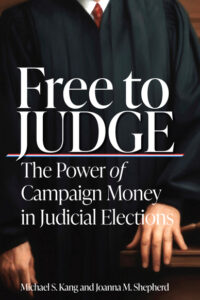
Free to Judge: The Power of Campaign Money in Judicial Elections
Stanford University Press, August 2023
The idea that wealthy people use their money to influence things, including politics, law, and media will surprise very few people. However, as Michael S. Kang and Joanna Shepherd argue in this readable and rich study of the state judiciary, the effect of money on judicial outcomes should disturb and anger everyone. In the current system that elects state judges, the rich and powerful can spend money to elect and re-elect judges who decide cases the way they want. Free to Judge is about how and why money increasingly affects the dispensation of justice in our legal system, and what can be done to stop it.
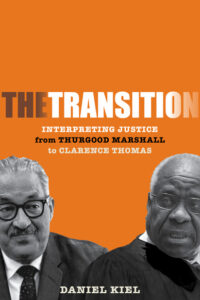
Daniel Kiel (The University of Memphis Cecil C. Humphreys School of Law)
The Transition: Interpreting Justice from Thurgood Marshall to Clarence Thomas
Stanford University Press, April 2023
Every Supreme Court transition presents an opportunity for a shift in the balance of the third branch of American government, but the replacement of Thurgood Marshall with Clarence Thomas in 1991 proved particularly momentous. Not only did it shift the ideological balance on the Court; it was inextricably entangled with the persistent American dilemma of race. In The Transition, this most significant transition is explored through the lives and writings of the first two African American justices on Court, touching on the lasting consequences for understandings of American citizenship as well as the central currents of Black political thought over the past century. In their lives, Thurgood Marshall and Clarence Thomas experienced the challenge of living and learning in a world that had enslaved their relatives and that continued to subjugate members of their racial group. On the Court, their judicial writings—often in concurrences or dissents—richly illustrate the ways in which these two individuals embodied these crucial American (and African American) debates—on the balance between state and federal authority, on the government’s responsibility to protect its citizens against discrimination, and on the best strategies for pursuing justice. The gap between Justices Marshall and Thomas on these questions cannot be overstated, and it reveals an extraordinary range of thought that has yet to be fully appreciated. The 1991 transition from Justice Marshall to Justice Thomas has had consequences that are still unfolding at the Court and in society. Arguing that the importance of this transition has been obscured by the relegation of these Justices to the sidelines of Supreme Court history, Daniel Kiel shows that it is their unique perspective as Black justices – the lives they have lived as African Americans and the rooting of their judicial philosophies in the relationship of government to African Americans – that makes this succession echo across generations.
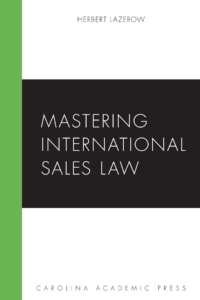
Herbert Lazerow (University of San Diego School of Law)
Mastering International Sales Law
Carolina Academic Press, 2023
This book is designed for the law student studying international sales contracts and for the many lawyers who want a quick introduction to the area. The field is of growing importance. In 1960 and 1970, the sum of U.S. imports and exports of goods constituted 6% and 8% of U.S. gross domestic product. In 1980 and 1990, that percentage rose to 17% and 15%. In the last three decades, the ratio of the value of imports plus exports to gross domestic product has hovered around 20%.
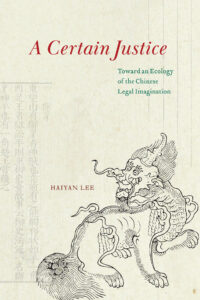
Haiyan Lee (Stanford University)
A Certain Justice: Toward an Ecology of the Chinese Legal Imagination
University of Chicago Press, June 2023
To many outsiders, China has an image as a realm of Oriental despotism where law is at best window dressing and at worst an instrument of coercion and tyranny. In this highly original contribution to the interdisciplinary field of law and humanities, Haiyan Lee contends that this image arises from a skewed understanding of China’s political-legal culture, particularly the failure to distinguish what she calls high justice and low justice. In the Chinese legal imagination, Lee shows, justice is a vertical concept, with low justice between individuals firmly subordinated to the high justice of the state. China’s political-legal culture is marked by a mistrust of law’s powers, and as a result, it privileges substantive over procedural justice. Calling on a wide array of narratives—stories of crime and punishment, subterfuge and exposé, guilt and redemption—A Certain Justice helps us recognize the fight for justice outside the familiar arenas of liberal democracy and the rule of law.
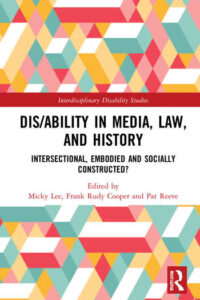
Mikey Lee (Suffolk University) Frank Rudy Cooper (Willam S. Boyd School of Law at UNLV) Patricia Reeve (Suffolk University)
Dis/ability in Media, Law and History Intersectional, Embodied and Socially Constructed?
Routledge, June 2023
This book explores how being “disabled” originates in the physical world, social representations and rules, and historical power relations—the interplay of which render bodies “normal” or not. Do parking signs that represent people in wheelchairs as self-propelling influence how we view dis/ability? How do wheelchair users understand their own bodies and an environment not built for them? By asking questions like these the authors reveal how normalization has informed people’s experiences of their bodies and their fight for substantive equality. Understanding these processes requires acknowledging the tension between social construction and embodiment as well as centering the intersection of dis/abilities with other identities, such as race, class, gender, sex orientation, citizen status, and so on. Scholars and researchers will find that this book provides new avenues for thinking about dis/ability. A wider audience will find it accessible and informative.
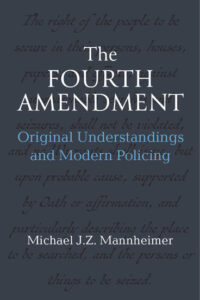
The Fourth Amendment: Original Understandings and Modern Policing
University of Michigan Press, August 2023
While it seems obvious that police are required to obey the law, this book argues that courts have lost track of that requirement due to misinterpreting the two constitutional provisions governing police conduct: the Fourth and Fourteenth Amendments. The Fourth Amendment forbids “unreasonable searches and seizures” and is the source of most constitutional constraints on policing. Although that provision technically applies only to the federal government, the Fourteenth Amendment, ratified in the wake of the Civil War, has been deemed to apply the Fourth Amendment to the States. This book contends that the courts’ misinterpretation of these provisions has led them to hold federal and state law enforcement mistakenly to the same constitutional standards. By analyzing original understandings of the Fourth and Fourteenth, this book concludes that different constraints on searches and seizures should apply depending on whether the federal or a state government is acting. The book explores what Fourth Amendment doctrine would look like if the Supreme Court paid greater attention to values underlying the Fourteenth Amendment in applying the Fourth Amendment to the states.
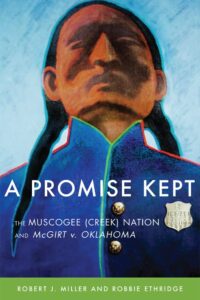
Robert J. Miller (ASU Sandra Day O’Connor College of Law), Robbie Ethridge (University of Mississippi)
A Promise Kept: The Muscogee (Creek) Nation and McGirt v. Oklahoma
University of Oklahoma Press, January 2023
“At the end of the Trail of Tears there was a promise,” U.S. Supreme Court Justice Neil Gorsuch wrote in the decision issued on July 9, 2020, in the case of McGirt v. Oklahoma. And that promise, made in treaties between the United States and the Muscogee (Creek) Nation more than 150 years earlier, would finally be kept. With the Court’s ruling, the full extent of the Muscogee (Creek) Reservation was reaffirmed—meaning that 3.25 million acres of land in Oklahoma, including part of the city of Tulsa, were recognized once again as “Indian Country” as defined by federal law. A Promise Kept explores the circumstances and implications of McGirt v. Oklahoma, likely the most significant Indian law case in well over 100 years. Combining legal analysis and historical context, this book gives an in-depth, accessible account of how the case unfolded and what it might mean for Oklahomans, the Muscogee (Creek) Nation, and other tribes throughout the United States.
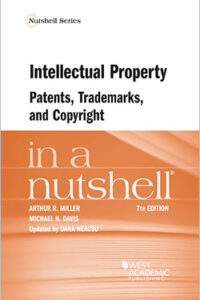
Intellectual Property, Patents, Trademarks, and Copyright in a Nutshell
West Academic Publishing, 2023
Authors emeritus professor Michael Davis and famed Harvard professor Arthur Miller provide authoritative coverage on the foundations of patents, trademarks, and copyright laws. Authoritative treatment of all relevant doctrines and the latest statutory and judicial changes, with up-to-date coverage provided by associate professor of legal research, Dana Neacşu. Text further addresses relevant torts, property, antitrust, regulatory, and federalism intersections with intellectual property law.
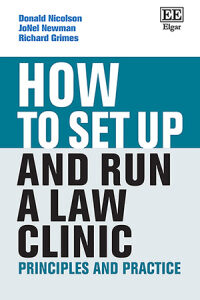
How to Set up and Run a Law Clinic
Edward Elgar Publishing, 2023
This accessible How To Guide provides practical, expert guidance on how to successfully set up and run a law clinic. Donald Nicolson, JoNel Newman and Richard Grimes explore the process of designing a clinic to address unmet legal needs, enhance student learning, and maximise the additional benefits of a clinic.
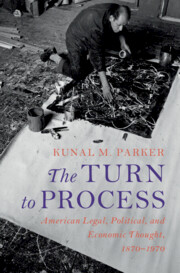
The Turn to Process
Cambridge University Press, November 2023
Kunal M. Parker explores the massive reorientation of American legal, political, and economic thinking between 1870 and 1970. Over this period, American conceptions of law, democracy, and markets went from being oriented around truths, ends, and foundations to being oriented around methods, processes, and techniques. No longer viewed as founded in justice and morality, law became a way of doing things centered around legal procedure. Shedding its foundations in the ‘people,’ democracy became a technique of governance consisting of an endless process of interacting groups.
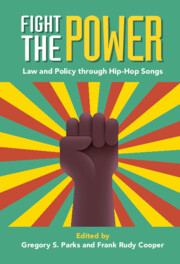
Gregory S. Parks (Wake Forest School of Law) Frank Rudy Cooper (William S. Boyd School of Law at UNLV)
Fight the Power: Law & Policy through Hip Hop Songs
Cambridge University Press, February 2023
Taking inspiration from Public Enemy’s lead vocalist Chuck D – who once declared that ‘rap is the CNN of young Black America’ – this volume brings together leading legal commentators to make sense of some of the most pressing law and policy issues in the context of hip-hop music and the ongoing struggle for Black equality. Contributors include MSNBC commentator Paul Butler, who grapples with race and policing through the lens of N.W.A.’s song ‘Fuck tha Police’, ACLU President Deborah Archer, who considers the 2014 uprisings in Ferguson, Missouri, and many other prominent scholars who speak of poverty, LGBTQ+ rights, mass incarceration, and other crucial topics of the day. Written to ‘say it plain’, this collection will be valuable not only to students and scholars of law, African-American studies, and hip-hop, but also to everyone who cares about creating a more just society.
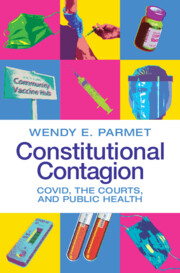
Northeastern University School of Law)
Constitutional Contagion: Covid, the Courts and Public Health
Cambridge University Press, 2023
Constitutional law has helped make Americans unhealthy. Drawing from law, history, political theory, and public health research, Constitutional Contagion explores the history of public health laws, the nature of liberty and individual rights, and the forces that make a nation more or less vulnerable to contagion. In this groundbreaking work, Wendy Parmet documents how the Supreme Court departed from past practice to stymie efforts to mitigate the COVID-19 pandemic and demonstrates how pre-pandemic court decisions helped to shatter social contracts, weaken democracy, and perpetuate the inequities that made the United States especially vulnerable when COVID-19 struck. Looking at judicial decisions from an earlier era, Parmet argues that the Constitution does not compel the stark individualism and disregard of public health that is evident in contemporary constitutional law decisions. Parmet shows us why, if we are to be a healthy nation, constitutional law must change.

, 2023
All of us, including the most elevated, sometimes make unwise decisions related to conflict and difficult situations. In this book, Leonard Riskin-law professor, mediator, and mindfulness teacher-helps us understand how and why this happens and what we can do about it, through a new framework that integrates negotiation, mindfulness, and internal family systems. Drawing on decades of practice, research, and teaching, this book extends Riskin’s influential writings and brings new insights to accepted ideas about negotiation. It could help anyone deal better with others, or with themselves.
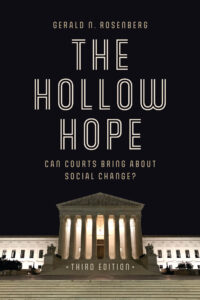
Gerald N. Rosenberg (University of Chicago Law)
The Hollow Hope: Can Courts Bring About Social Change?
University of Chicago Press, May 2023
Since its first publication in 1991, The Hollow Hope has spurred debate and challenged assumptions on both the left and the right about the ability of courts to bring about durable political and social change. What Gerald N. Rosenberg argued then, and what he confirms today through new evidence in this edition, is that it is nearly impossible to generate significant reforms through litigation: American courts are ineffective and relatively weak, far from the uniquely powerful sources for change they are often portrayed to be. This third edition includes new data and a substantially updated analysis of civil rights, abortion rights and access, women’s rights, and marriage equality. Addressing changes in the political and social environment, Rosenberg draws lessons from the re-segregation of public schools, victories in marriage equality, and new obstacles to abortion access. Through these and other cases, the third edition confirms the power of the book’s original explanatory framework and deepens our understanding of the limits of judicial action in support of social reform, as well as the conditions under which courts do produce change.
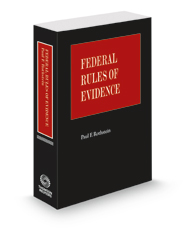
Paul F. Rothstein (Georgetown University Law Center)
Federal Rules of Evidence
Thomson/Reuters/West, 2023
Federal Rules of Evidence sets out each rule with expert analysis and practice commentary by Georgetown law professor and trial lawyer Paul Rothstein, an acknowledged expert on the rules and their practical application in litigation and trial. This work reports and analyzes not only recent amendments and proposed amendments, but also a plethora of new cases and important developments.
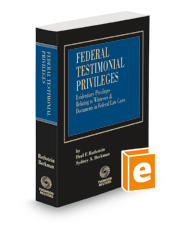
Paul F. Rothstein (Georgetown University Law Center), Syndey Beckman (Lincoln Memorial University)
Federal Testimonial Privileges
Thomson/Reuters/West, 2022 – 2023
Federal Testimonial Privileges provides up-to-date, practical guidance in using and citing the law of evidentiary privileges in federal proceedings. This one-volume treatise provides expert analysis on applying various privileges, such as attorney-client, physician-patient, husband-wife, executive, informant, reporter, trade secret, and other available privileges throughout the litigation process.
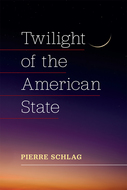
Pierre Schlag (University of Colorado Law School)
Twilight of the American State
University of Michigan Press, 2023
The sudden emergence of the Trump nation surprised nearly everyone, including journalists, pundits, political consultants, and academics. When Trump won in 2016, his ascendancy was widely viewed as a fluke. Yet time showed it was instead the rise of a movement—angry, militant, revanchist, and unabashedly authoritarian. How did this happen? Twilight of the American State offers a sweeping exploration of how law and legal institutions helped prepare the grounds for this rebellious movement. The controversial argument is that, viewed as a legal matter, the American state is not just a liberal democracy, as most Americans believe. Rather, the American state is composed of an uneasy and unstable combination of different versions of the state—liberal democratic, administered, neoliberal, and dissociative. Each of these versions arose through its own law and legal institutions. Each emerged at different times historically. Each was prompted by deficits in the prior versions. Each has survived displacement by succeeding versions. All remain active in the contemporary moment—creating the political-legal dysfunction America confronts today. Pierre Schlag maps out a big picture view of the tribulations of the American state. The book abjures conventional academic frameworks, sets aside prescriptions for quick fixes, dispenses with lamentations about polarization, and bypasses historical celebrations of the American Spirit.

David Schleicher (Yale Law School)
In a Bad State
Oxford University Press, 2023
An authoritative review of the long history of federal responses to state and local budget crises, from Alexander Hamilton through the COVID-19 pandemic, that reveals what is at stake when a state or city can’t pay its debts and provides policy solutions to an intractable American problem.
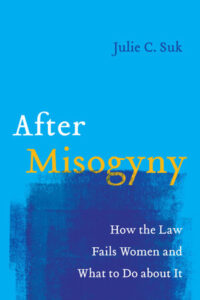
Julie C. Suk (Fordham University Law School)
After Misogyny: How the Law Fails Women & What to Do About It
University of California Press, April 2023
Just as racism is embedded in the legal system, so is misogyny—even after the law proclaims gender equality and criminally punishes violence against women. In After Misogyny, Julie C. Suk shows that misogyny lies not in animus but in the overempowerment of men and the overentitlement of society to women’s unpaid labor and undervalued contributions. This is a book about misogyny without misogynists. From antidiscrimination law to abortion bans, the law fails women by keeping society’s dependence on women’s sacrifices invisible. Via a tour of constitutional change around the world, After Misogyny shows how to remake constitutional democracy. Women across the globe are going beyond the antidiscrimination paradigm of American legal feminism and fundamentally resetting baseline norms and entitlements. That process, what Suk calls a “constitutionalism of care,” builds the public infrastructure that women’s reproductive work has long made possible for free.
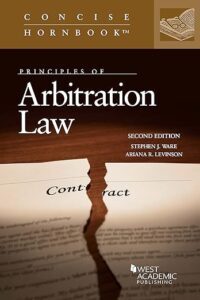
Principles of Arbitration Law
West Academic Publishing, 2023
This book is an authoritative and extensively cited treatise on arbitration. It thoroughly discusses general arbitration law—from federal preemption of state law to the formation, performance, and enforcement of arbitration agreements—and provides in-depth coverage of specialized law governing international arbitration and labor arbitration. The last few decades have witnessed the growth of a large body of legal doctrine—from statutes, judicial decisions, and other sources—focused on arbitration. This Concise Hornbook summarizes that body of law, so should be useful to lawyers and scholars researching arbitration law and to students learning about arbitration.
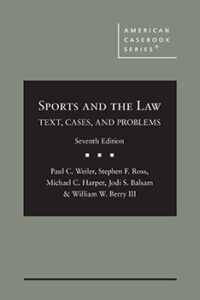
Paul C. Weiler (Harvard University Law School), Stephen F. Ross (Penn State University), Michael C. Harper (Boston University School of Law), Jodi S. Balsam (Brooklyn Law School)
Sports and the Law
West Academic Publishing, 2023
The seventh edition of this leading casebook explores legal issues in both professional and amateur sports, organized to provide instructors with flexibility to cover selected doctrinal areas or industry sectors. Extended treatment is given to the key subjects of labor, antitrust, intellectual property, and the law of private associations. The casebook also covers the important topic of integrity in sports, the unique office of the league commissioner and its special concerns with the “best interests of sports”; the contract, antitrust, and labor law dimensions of the player-labor market; the role of the player agent in a unionized industry; the economic and legal implications of agreements among league owners and responses to rival leagues; the system of college athletics as governed by the NCAA and subject to Title IX; equity in sports, and the operation of international Olympic sports.
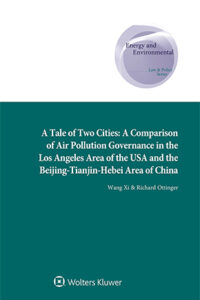
, 2023
This book focuses on two of the world’s most prominent cases and explores how people in the areas of Los Angeles and Beijing-Tianjin-Hebei (BTH) established governance processes to combat air pollution and how the major actors in each area worked to make their region a better place to live. Employing the expertise of teams of knowledgeable environmental law experts from both China and the United States, the authors identify and analyze similarities and differences in the respective legal and policy experiences as actors succeeded in greatly improving the air quality of their areas.
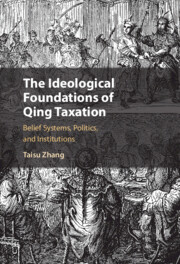
Taisu Zhang (Yale Law School)
The Ideological Foundations of Qing Taxation: Belief Systems, Politics, and Institutions
Cambridge University Press, February 2023
How states develop the capacity to tax is a question of fundamental importance to political science, legal theory, economics, sociology, and history. Increasingly, scholars believe that China’s relative economic decline in the 18th and 19th centuries was related to its weak fiscal institutions and limited revenue. This book argues that this fiscal weakness was fundamentally ideological in nature. Belief systems created through a confluence of traditional political ethics and the trauma of dynastic change imposed unusually deep and powerful constraints on fiscal policymaking and institutions throughout the final 250 years of China’s imperial history. Through the Qing example, this book combs through several interaction dynamics between state institutions and ideologies. The latter shapes the former, but the former can also significantly reinforce the political durability of the latter. In addition to its historical analysis of ideological politics, this book makes a major contribution to the longstanding debate on Sino-European divergence.
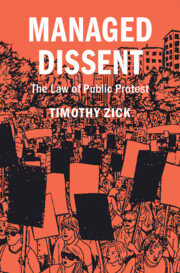
Timothy Zick (William & Mary Law School)
Managed Dissent: The Law of Public Protest
Cambridge University Press, May 2023
The mass street demonstrations that followed the 2020 police murder of George Floyd were perhaps the largest in American history. These events confirmed that even in a digital era, people rely on public dissent to communicate grievances, change public discourse, and stand in collective solidarity with others. However, the demonstrations also showed that the laws surrounding public protest make public contention more dangerous, more costly, and less effective. Police fired tear gas into peaceful crowds, used physical force against compliant demonstrators, imposed broad curfews, limited the places where protesters could assemble, and abused ‘unlawful assembly’ and other public disorder laws. These and other pathologies epitomize a system in which public protest is tightly constrained in the name of public order. Managed Dissent argues that in order to preserve the venerable tradition of public protest in the US, we must reform several aspects of the law of public protest.
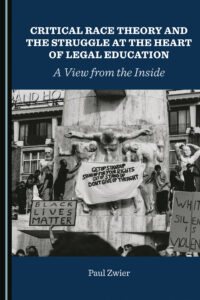
Critical Race Theory and the Struggle at the Heart of Legal Education: A View from the Inside
Cambridge Scholars Publishing, September 2023
This book is an examination of the reception of critical race theory (CRT) in America’s legal education system. Critical race theory has been roiling legal education since the aftermath of Obama’s presidency. The killings of unarmed Black people fueled Black Lives Matter (BLM) protests in law schools, which created a sense of urgency behind the plea for the law to do more to stop the killings of unarmed Black people. Some BLM-led protests called for faculty and administers to be fired if they didn’t act.
Faculty Books Published in 2022
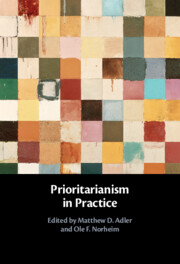
Matthew D. Adler (Duke Law School), Ole F. Norheim
Prioritarianism in Practice
Cambridge University Press, April 2022
Prioritarianism is an ethical theory that gives extra weight to the well-being of the worse off. In contrast, dominant policy-evaluation methodologies, such as benefit-cost analysis, cost-effectiveness analysis, and utilitarianism, ignore or downplay issues of fair distribution. This book uses prioritarianism as a methodology to evaluate governmental policy across a variety of policy domains: taxation, health policy, risk regulation, education, climate policy, and the COVID-19 pandemic.
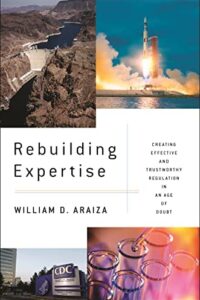
William Araiza (Brooklyn Law School)
Rebuilding Expertise: Creating Effective and Trustworthy Regulation in an Age of Doubt
New York University Press, June 2022
In Rebuilding Expertise, William D. Araiza investigates the sources of the plummet in public trust in the ability of the Federal government to do the right thing and explains how we might rebuild trust in our public institutions. The author examines the history of this deterioration of trust and reveals how politicians from Clinton to Trump have allowed that deterioration to continue, and, in some cases, actively encouraged it. Using an interdisciplinary approach, with insights from history, political science, law, and public administration, Araiza explores our current bureaucratic malaise and presents a roadmap to finding our way out of it, toward a regime marked by effective, expert regulation that remains democratically accountable and politically legitimate.
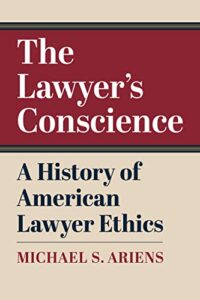
Michael S. Ariens (St. Mary’s University School of Law)
The Lawyer’s Conscience: A History of American Lawyer Ethics
Kansas Press, November 2022
American lawyers have defended the exercise of this power from the Revolution to the present by arguing their work is channeled by the profession’s standards of ethical behavior. Those standards demand that lawyers serve the public interest and the interests of their paying clients before themselves. The duties owed both to the public and to clients meant lawyers were in the marketplace selling their services, but not of the marketplace. This is the story of power and the limits of ethical constraints to ensure such power is properly wielded. The Lawyer’s Conscience is the first book examining the history of American lawyer ethics, ranging from the mid-eighteenth century to the “professionalism” crisis facing lawyers today.
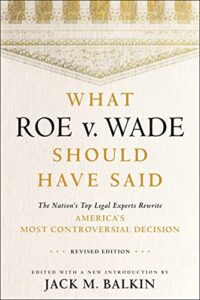
Jack M. Balkin (Yale Law School)
What Roe v. Wade Should Have Said
The Nation’s Top Legal Experts Rewrite America’s Most Controversial Decision, Revised Edition Intellectual Property and the Brain
NYU Press, 2022
Originally published in 2005, What Roe v. Wade Should Have Said asked eleven distinguished constitutional scholars to rewrite the opinions in this landmark case in light of thirty years’ experience but making use only of sources available at the time of the original decision. Offering the best arguments for and against the constitutional right to abortion, the contributors have produced a series of powerful essays that get to the heart of this fascinating case. In addition, Jack Balkin gives a detailed historical introduction that chronicles the Roe litigation—and the constitutional and political clashes that followed it—and explains the Dobbs decision and its aftermath.
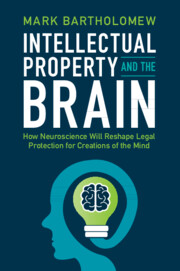
Mark Bartholomew (University at Buffalo School of Law)
Intellectual Property and the Brain
Cambridge Press, 2022
Although legal scholars have begun to explore the implications of neuroscientific research for criminal law, the field has yet to assess the potential of such research for intellectual property law – a legal regime governing over one-third of the US economy. Intellectual Property and the Brain addresses this gap by showing how tools meant to improve our understanding of human behavior inevitably shape the balance of power between artists and copyists, businesses and consumers. This first of its kind book demonstrates how neuroscience can improve our flawed approach to regulating creative conduct and commercial communications when applied with careful attention to the reasons that our system of intellectual property law exists. With a host of real-life examples of art, design, and advertising, the book charts a path forward for legal actors seeking reforms that will unlock artistic innovation, elevate economic productivity, and promote consumer welfare.
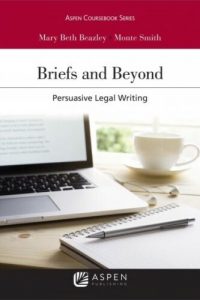
Mary Beth Beazley (University of Nevada, Las Vegas, Boyd School of Law) and Monte Smith (Ohio State University Moritz College of Law)
Briefs and Beyond: Persuasive Legal Writing
Aspen Publishing, February 2022
The book provides law professors options to supplement a persuasive writing course with complaints, demand letters, and other persuasive documents while not overwhelming their students. Professors and student will benefit from: a behavioral approach to legal writing; a focus on how documents look as well as what they say; sidebars that answer students’ common questions as they go along; effective formulas for legal writing that ease the writing process, and; many examples of both good and bad writing throughout that illustrate concepts covered in the text.
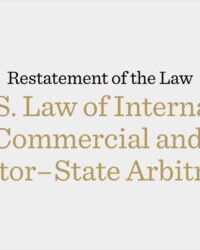
George A. Bermann (Columbia University School of Law), Jack J. Coe, Jr. (Pepperdine University School of Law), Christopher R. Drahozal (University of Kansas School of Law), Catherine A. Rogers (The Pennsylvania State University, Dickinson School of Law)
Restatement of the U.S. Law of International Commercial & Investor-State Arbitration
American Law Institute, 2022
This project restates the U.S. law of international commercial and investor-state arbitration and covers, among other topics, arbitration agreements; conduct of and the judicial role in international arbitral proceedings in the United States; awards; recourse from and enforcement of international arbitral awards rendered in the United States; the judicial role in international arbitral proceedings abroad; enforcement of international arbitral awards rendered abroad; the preclusive effect of international arbitral awards; and ICSID Convention arbitration.
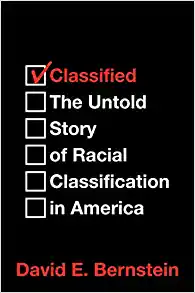
David E. Bernstein (George Mason University Antonin Scalia Law School)
Classified: The Untold Story of Racial Classification in America
Bombardier Books, July 2022
Americans are understandably squeamish about official racial and ethnic classifications. Nevertheless, they are ubiquitous in American life. Applying for a job, mortgage, university admission, citizenship, government contracts, and much more involves checking a box stating whether one is Black, White, Asian, Hispanic, or Native American. While reviewing the surprising history of American racial classifications, Classified raises questions about the classifications’ coherence, logic, and fairness.
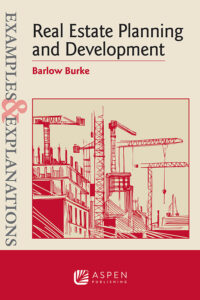
Barlow Burke (American University Washington College of Law)
Examples & Explanations for Real Estate Development
Aspen Publishing, 2022
A favorite classroom prep tool of successful students that is often recommended by professors, the Examples & Explanations (E&E) series provides an alternative perspective to help you understand your casebook and in-class lectures. Each E&E offers hypothetical questions complemented by detailed explanations that allow you to test your knowledge of the topics in your courses and compare your own analysis.
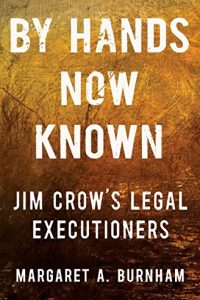
Margaret A. Burnham (Northeastern University School of Law)
By Hands Now Known: Jim Crow’s Legal Executioners
W.W. Norton & Company, 2022
This book challenges our understanding of the Jim Crow era by exploring the relationship between formal law and background legal norms in a series of harrowing cases from 1920 to 1960. From rendition, the legal process by which states make claims to other states for the return of their citizens, to battles over state and federal jurisdiction and the outsize role of local sheriffs in enforcing racial hierarchy, Burnham maps the criminal legal system in the mid-twentieth-century South, and traces the unremitting line from slavery to the legal structures of this period?and through to today.
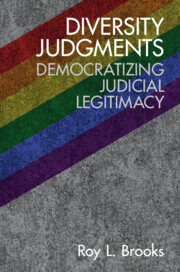
Roy L. Brooks (University of San Diego)
Diversity Judgments Democratizing Judicial Legitimacy
Cambridge University Press, March 2022
The US Supreme Court’s legitimacy-its diminishing integrity and contribution to the good of society-is being questioned today like no other time in recent memory. Criticisms reflect the perspectives of both ‘insiders’ (straight white males) and ‘outsiders’ (mainly people of color, women, and the LGBTQ community). Neither perspective digs deep enough to get at the root of the Court’s legitimacy problem, which is one of process. The Court’s process of decision-making is antiquated and out of sync with a society that looks and thinks nothing like the America of the eighteenth century, when the process was first implemented. The current process marginalizes many Americans who have a right to feel disenfranchised. Leading scholar of jurisprudence Roy L. Brooks demonstrates how the Court can modernize and democratize its deliberative process, to be more inclusive of the values and life experiences of Americans who are not straight white males.
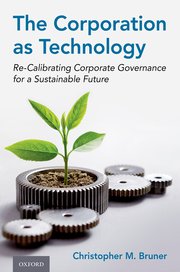
Christopher M. Bruner (University of Georgia School of Law)
The Corporation as Technology: Re-Calibrating Corporate Governance for a Sustainable Future
Oxford University Press, April 2022
Examines dynamics of the corporate form and corporate law that incentivize harmful excesses, and presents an alternative vision to render corporate activities more sustainable. Offers a unique perspective by presenting corporations as a dynamic legal technology that policymakers can re-calibrate in response to changing landscapes. Explores how the corporate form can secure a more sustainable future through differing approaches to the structure and operations of the board, the allocation of governance powers among various stakeholders, and exposure to liability for corporate decision-making.
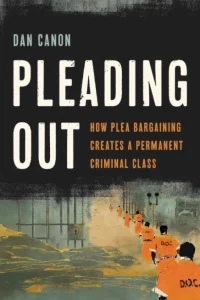
Dan Canon (University of Louisville, Louis D. Brandeis School of Law)
Pleading Out: How Plea Bargaining Creates a Permanent Criminal Class
Basic Books, March 2022
Most Americans believe that the jury trial is the backbone of our criminal justice system. But in fact, the vast majority of cases never make it to trial: almost all criminal convictions are the result of a plea bargain, a deal made entirely out of the public eye. The author argues that plea bargaining may swiftly dispose of cases, but it also fuels an unjust system. This practice produces a massive underclass of people who are restricted from voting, working, and otherwise participating in society. And while innocent people plead guilty to crimes they did not commit in exchange for lesser sentences, the truly guilty can get away with murder. The book looks at the ugly truth about what’s wrong with America’s criminal justice system today—and offers a prescription for meaningful change.
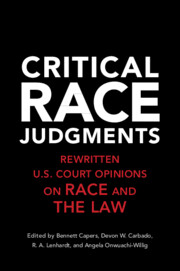
Bennett Capers (Fordham Law School), Devon W. Carbado (University of California, Los Angeles, School of Law), R. A. Lenhardt (Georgetown University Law Center), and Angela Onwuachi-Willig (Boston University School of Law)
Critical Race Judgments: Rewritten U.S. Court Opinions on Race and the Law
Cambridge University Press, April 2022
By re-writing US Supreme Court opinions that implicate critical dimensions of racial justice, Critical Race Judgments demonstrates that it’s possible to be judge and a critical race theorist. Specific issues covered in these cases include the death penalty, employment, voting, policing, education, the environment, justice, housing, immigration, sexual orientation, segregation, and mass incarceration.
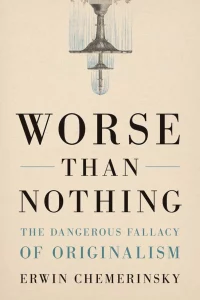
Erwin Chemerinsky (University of California, Berkeley School of Law)
Worse Than Nothing: The Dangerous Fallacy of Originalism
Yale University Press, September 2022
Originalism, the view that the meaning of a constitutional provision is fixed when it is adopted, was once the fringe theory of a few extremely conservative legal scholars but is now a well-accepted mode of constitutional interpretation. Three of the Supreme Court’s nine justices explicitly embrace the originalist approach, as do increasing numbers of judges in the lower courts. The author gives a comprehensive analysis of the problems that make originalism unworkable as a method of constitutional interpretation. He argues that the framers themselves never intended constitutional interpretation to be inflexible and shows how it is often impossible to know what the “original intent” of any particular provision was. Though supporters tout it as a politically neutral and objective method, originalist interpretation tends to disappear when its results fail to conform to modern conservative ideology.
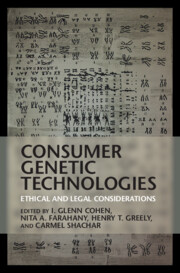
I. Glenn Cohen (Harvard Law School), Nita A. Farahany (Duke Law School), Henry T. Greely (Stanford Law School), and Carmel Shachar (Harvard Law)
Consumer Genetic Technologies: Ethical and Legal Considerations
Cambridge University Press, 2022
The rise of genetic testing is often promoted as the democratization of genetics by enabling individuals to gain insights into their unique makeup. At the same time, many have raised concerns that genetic testing and sequencing reveal intensely personal and private information. As these technologies become increasingly available as consumer products, the ethical, legal, and regulatory challenges presented by genomics are ever looming. Assembling multidisciplinary experts, this volume evaluates the different models used to deliver consumer genetics and considers key questions related to the topic.
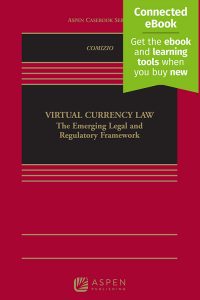
V. Gerard Comizio (American University Washington College of Law)
Virtual Currency Law: The Emerging Legal and Regulatory Framework
Aspen Publishing, 2022
This book explores the emerging legal and regulatory framework governing virtual currency activities. Since the advent of the first virtual currency (Bitcoin) in 2008, a new global financial ecosystem has emerged, composed of an increasing number and variety of digital assets. In this context, the book explores how governments, regulators and legal experts are increasingly looking to existing securities, banking, commodities, money transmission, payment systems, commercial, anti-money laundering, fintech, cyber and data security, tax, Constitutional and international laws to address the unique, novel, and complex issues presented by virtual currency. The book also explores how the ubiquitous nature of virtual currency has led to it being viewed as the legal and regulatory equivalent of a wide range of traditional corporate and financial services products, services, activities, and investments.
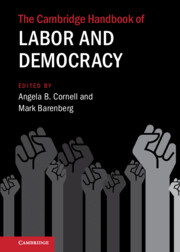
Angela B. Cornell (Cornell Law School), Mark Barenberg (Columbia Law School)
The Cambridge Handbook of Labor and Democracy
Cambridge University Press, January 2022
In this timely handbook, scholars in law, political science, history, and sociology explore the role of organized labor and the working class in the historical construction of democracy. They analyze recent patterns of democratic erosion, examining its relationship to the political weakening of organized labor and, in several cases, the political alliances forged by workers in contexts of nationalist or populist political mobilization. The volume breaks new ground in providing cross-regional perspectives on labor and democracy in the United States, Europe, Latin America, Africa, and Asia.
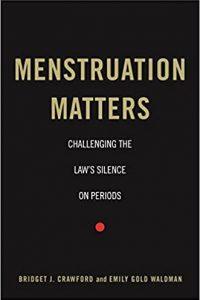
Bridget J. Crawford (Elisabeth Haub School of Law at Pace University) and Emily Gold-Waldman (Elisabeth Haub School of Law at Pace University)
Menstruation Matters: Challenging the Law’s Silence On Periods
NYU Press, June 2022
The book explores the role of law in the movement to recognize the fundamental human right to address menstruation in a safe and affordable way, free of stigma, shame, or barriers to access. It asks what the law currently says about menstruation and provides a roadmap for legal reform that can move society closer to a world where no one is held back or disadvantaged by menstruation. The authors examine these issues in a wide range of contexts, from schools to workplaces to prisons to tax policies and more. Ultimately, they seek to transform both law and society so that menstruation is no longer an obstacle to full participation in all aspects of public and private life.
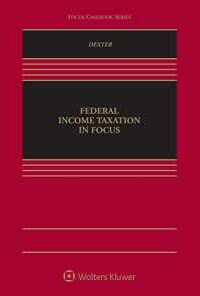
Bobby Dexter (Chapman University Fowler School of Law)
Federal Income Taxation in Focus, Second Edition
Aspen Publishing, 2022
This book helps prepare students for both the rigors of sophisticated tax practice and the challenge of advanced study in federal tax law. The author employs careful organization, engaging visual enhancements, and student-friendly exposition to communicate both foundational concepts & rules and highly technical refinements.
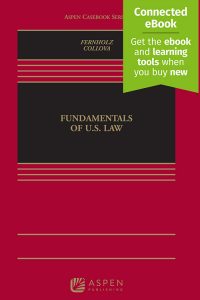
William Fernholz (University of California, Berkeley, School of Law) and Jodi L. Collova (University of California, Berkeley, School of Law)
Fundamentals of U.S. Law
Aspen Publishing, January 2022
The book introduces LLM students to the common law method of case analysis through concentrated study of topics in Tort and Constitutional Law as well as the “how” of legal practice in the United States. Students learn how to read cases, synthesize rules from reasoning, apply those rules to novel situations, and predict how the law may develop.
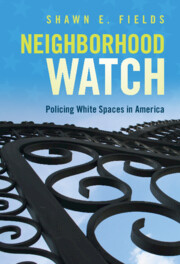
Shawn E. Fields (Campbell University Norman Adrian Wiggins School of Law)
Neighborhood Watch: Policing White Spaces in America
Cambridge University Press, May 2022
Although racism has plagued the American justice system since the nation’s colonial beginnings, private White Americans are taking matters into their own hands. Neighborhood Watch examines the specific ways people police America’s color line to protect ‘White spaces.’
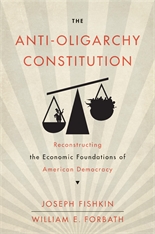
Joseph Fishkin (University of California, Los Angeles School of Law) William E. Forbath (University of Texas at Austin)
The Anti-Oligarchy Constitution
Harvard University Press, February 2022
Joseph Fishkin and William Forbath show in their retelling of constitutional history, a commitment to prevent oligarchy once stood at the center of a robust tradition in American political and constitutional thought. The authors demonstrate that reformers, legislators, and even judges working in this “democracy-of-opportunity” tradition understood that the Constitution imposes a duty on legislatures to thwart oligarchy and promote a broad distribution of wealth and political power. The authors places this argument in context with today’s new gilded age.
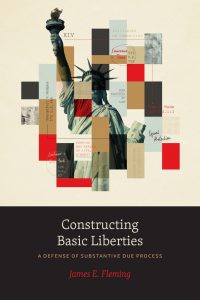
James E. Fleming (Boston University School of Law)
Constructing Basic Liberties: A Defense of Substantive Due Process
University of Chicago Press, August 2022
From reproductive rights to marriage for same-sex couples, many basic liberties owe their protection to landmark Supreme Court decisions that have hinged on the doctrine of substantive due process. This doctrine is controversial—a battleground for opposing views around the relationship between law and morality in circumstances of moral pluralism—and is deeply vulnerable today. The author rebuts popular arguments against substantive due process and shows that the Supreme Court has constructed basic liberties through common law constitutional interpretation: reasoning by analogy from one case to the next and making complex normative judgments about what basic liberties are significant for personal self-government.
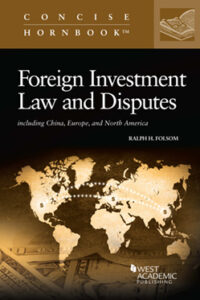
Ralph H. Folsom (University of San Diego Law)
Foreign Investment Law and Disputes including China, Europe, and North America
West Academic Press, 2022
Foreign Investment Law and Disputes including China, Europe and North America details foreign investment law, practice, regulation and especially dispute settlement. Citations and core foreign investment law (FIL) documents are available throughout this pragmatic Concise Hornbook. It has been designed with students, academics, lawyers, government officials and people in business in mind.
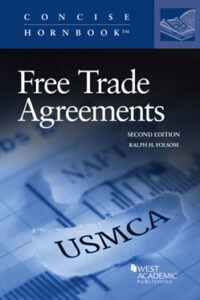
Ralph H. Folsom (University of San Diego Law)
Free Trade Agreements
West Academic Press, 2022
Free trade agreements (FTAs) now dominate global trade. This dominance is likely to continue for many years on every continent. Already, well over half of all international trade takes place under FTAs. Free Trade Agreements 2d examines the origins of free trade agreements (FTAs) and customs unions (CUs) under Article 24 of the GATT. Article 24 permits but attempts to regulate their creation, an effort that failed early on. A sleeping giant for decades, FTAs were re-awakened by the path-breaking Canada-U.S. FTA of 1989. In 1994, NAFTA triggered an onslaught of diverse and complex FTAs around the globe, in time largely overwhelming the impact of the establishment of the World Trade Organization in 1995.
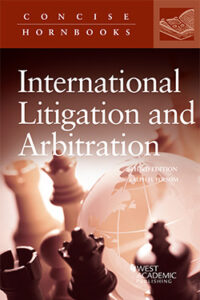
Ralph H. Folsom (University of San Diego Law)
International Litigation and Arbitration
West Academic Press, 2022
International Litigation and Arbitration, 3d is part of West Academic Publishing’s Concise Hornbook series. Its coverage in Chapters 1 and 2 commences with international dispute settlement alternatives and fundamentals, including Choice of Law, Choice of Forum and Forum Non Conveniens issues. Chapters 3 and 4 focus on International Commercial Arbitration and Foreign Investor-State Arbitrations. International Business Litigation is examined in five chapters: Jurisdiction, Procedure, Sovereign Defenses, Enforcement of Judgments and the EU Litigation System. Chapter 10 finishes with Intergovernmental Trade Dispute Settlement.
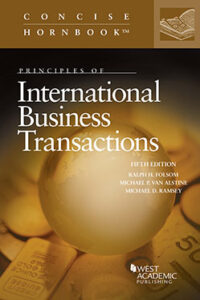
Ralph H. Folsom (University of San Diego Law), Michael P. Van Alstine (University of Maryland), Michael D. Ramsey (University of San Diego Law)
Principles of International Business Transactions
West Academic Press, 2022
The Fifth Edition of Principles of International Business Transactions provides a more comprehensive examination of the law relevant to the subject matter and detailed citations to caselaw and other supporting authorities. It can be used by courts and legal practitioners as a resource for research and analysis, as well as by students and professors as a supplement for any international business law course. It tracks the authors’ popular problem-oriented coursebook, International Business Transactions. Coverage moves sequentially from structuring international sales transactions to international sales law and letters of credit to regulation of international trade to transfers of technology to foreign investment to international business dispute settlement.
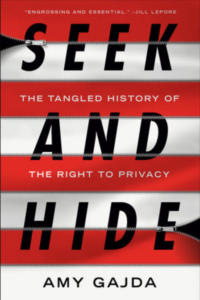
Amy Gajda (Tulane Law School)
Seek and Hide: THE TANGLED HISTORY OF THE RIGHT TO PRIVACY
Viking Publishing, April 2022
Should everyone have privacy in their personal lives? Can privacy exist in a public place? Is there a right to be left alone even in the United States? You may be startled to realize that the original framers were sensitive to the importance of privacy interests relating to sexuality and intimate life, but mostly just for powerful and privileged (and usually white) men.The battle between an individual’s right to privacy and the public’s right to know has been fought for centuries. The founders demanded privacy for all the wrong press-quashing reasons. Supreme Court justice Louis Brandeis famously promoted First Amendment freedoms but argued strongly for privacy too; and presidents from Thomas Jefferson through Donald Trump confidently hid behind privacy despite intense public interest in their lives. Today privacy seems simultaneously under siege and surging. And that’s doubly dangerous, as legal expert Amy Gajda argues. Too little privacy leaves ordinary people vulnerable to those who deal in and publish soul-crushing secrets. Too much means the famous and infamous can cloak themselves in secrecy and dodge accountability. Seek and Hide carries us from the very start, when privacy concepts first entered American law and society, to now, when the law allows a Silicon Valley titan to destroy a media site like Gawker out of spite. Muckraker Upton Sinclair, like Nellie Bly before him, pushed the envelope of privacy and propriety and then became a privacy advocate when journalists used the same techniques against him. By the early 2000s we were on our way to today’s full-blown crisis in the digital age, worrying that smartphones, webcams, basement publishers, and the forever internet had erased the right to privacy completely.
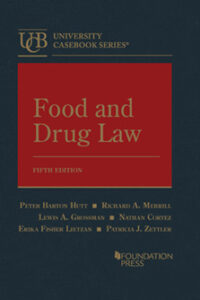
Lewis A. Grossman (American University, Washington College of Law), Nathan Cortez (Southern Methodist University, Dedman School of Law), Erika Fisher Lietzan (University of Missouri), Patricia J. Zettler (The Ohio State University Moritz College of Law)
Food and Drug Law
West Academic, 2022
FDA regulation touches most products that fill the shelves of our supermarkets and drug stores and virtually every product prescribed or used by the medical profession. Few other agencies regulate products or activities that play so intimate a role in our daily lives. Food and Drug Law is the law governing the actions taken by FDA and its sister agencies to oversee the safety of this vast universe of products, to ensure that the labeling (and in some cases advertising) of products is accurate and reliable, and to shepherd safe and effective new medical products onto the market. The book contains not only the most important court cases in the field, but also materials that show how food and drug law is developed and enforced outside of court.
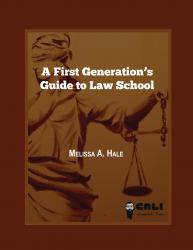
Melissa A. Hale (Loyola University Chicago School of Law)
A First Generation’s Guide to Law School
eLangdell Press, June 2022
This is written as a guide for first-generation students who are entering or are currently attending law school. It introduces students to law school vocabulary and available resources, gives guidance about how to prepare for the unique challenges of law school, and provides a roadmap for things like participating in class, studying for and taking exams, joining extracurriculars, taking care of your mental health, and networking. The guide includes interactive exercises that test the student’s knowledge of concepts, encourage the student to reflect on their own interests and experiences, and explore resources in their law school and elsewhere.
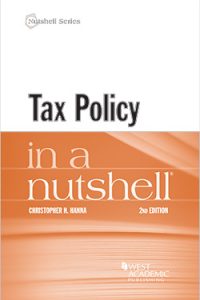
Christopher H. Hanna (Southern Methodist University, Dedman School of Law)
Hanna’s Tax Policy in a Nutshell, 2d
West Academic, 2022
This guide explains essential concepts in tax policy, including theories of taxation and their implementation, criteria in evaluating a tax system, tax bases, the Haig-Simons definition of income, Samuelson depreciation, the Cary Brown Theorem, capital gains and losses, tax expenditures, the distribution of the tax burden, and issues in corporate and international taxation. The book discusses the tax policy considerations of contemporary law, including the 2017 Tax Cuts and Jobs Act, the most comprehensive U.S. tax system reform in over thirty years.
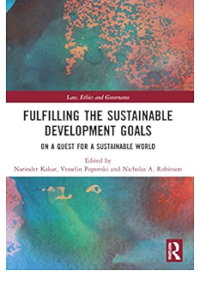
Routledge, 2022
This book contains assessment of the progress, or the lack of it, in implementing the UN Sustainable Development Goals (SDGs). Through review of the assessments and of case studies, readers can draw lessons from the actions that could work to positively address the goals. The 2030 Agenda for Sustainable Development is designed to catalyze action in critical areas of importance to humanity and the planet. The effort to implement the SDGs, however, demands a sense of urgency in the face of environmental degradation, climate change, emerging conflicts, and growing inequality, among a number of other socio-economic problems.

Andrew Koppelman (Northwestern University Pritzker School Law)
Burning Down the House: How the Libertarian Philosophy Was Corrupted by Delusion and Greed
St. Martin’s, 2022
Modern libertarianism showed how capitalism could improve life for everyone. Yet today, it’s a toxic blend of anarchism, disdain for the weak, and rationalization for environmental catastrophe. Libertarians today accept new, radical arguments that justify dishonest business practices and Covid deniers who refuse to wear masks in the name of “freedom.”
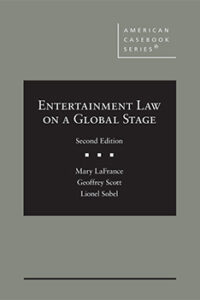
Mary LaFrance (UNLV School of Law), Geoffrey Scott (Penn State University), Lionel Sobel (Southwestern School of Law)
Entertainment Law on a Global Stage
West Academic Publishing, July 2022
The text contains complementary chapters that address both U.S. domestic and international issues in entertainment law. The individual chapters consider a plethora of discrete, yet diverse, aspects of entertainment law implicated in a global context. Due to its innovative construct and the resulting inherent versatility, the book could also be employed in a number of other courses within a broader curriculum including those focused on U.S. domestic entertainment law, an introductory course in select forms of intellectual property, a course in advanced torts that considers rights of personality, and the like.
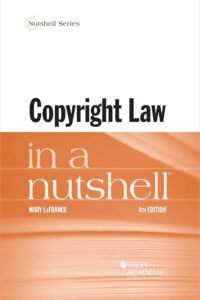
Mary LaFrance (UNLV School of Law)
Copyright Law in a Nutshell
West Academic Publishing, 2022
This product offers a compact yet comprehensive and up-to-date overview of U.S. copyright law in an uncluttered and readable format. Coverage ranges from the fundamental concepts of originality, authorship, and infringement to the highly technical rules governing digital phonorecord deliveries and digital public performance rights in sound recordings, the safe harbor provisions that limit the liability of Internet service providers, and the anti-circumvention and copyright management information provisions of the Digital Millennium Copyright Act. This updated edition includes detailed analysis of the changes introduced by the Music Modernization Act of 2018, as well as the creation of the Copyright Claims Board. The evolving doctrines of fair use and contributory liability are also given thorough attention.
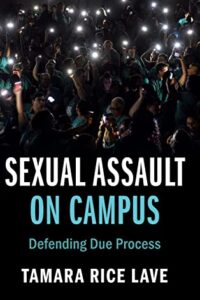
Tamara Rice Lave (University of Miami School of Law)
Sexual Assault on Campus: Defending Due Process
Cambridge University Press, June 2022
Fair adjudication of campus sexual assault is one of the most divisive issues facing the United States. Victims contend that schools aren’t doing enough to protect them, and accused students complain that they are presumed guilty. Sexual Assault on Campus: Defending Due Process begins by critically assessing the extent of the problem, before explaining why the criminal justice system has been unable to respond adequately. The book discusses the Department of Education’s attempts to force schools to take campus assault seriously and uses original data in assessing the fairness of adjudication in the wake of the 2011 ‘Dear Colleague Letter.’ It also includes excerpts from interviews with complainants, accused students, and administrators, which offer readers a first-hand account of these proceedings. Finally, the book provides a critical, in-depth look at the Title IX regulations put in place by the Trump Administration, with detailed recommendations for how they can be improved.
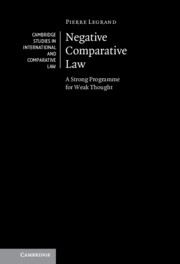
Pierre Legrand (Northwestern University Pritzker School of Law)
Negative Comparative Law: A Strong Programme for Weak Thought
Cambridge University Press, June 2022
Written under the sign of Beckett, this book addresses comparative law’s commitment to the deterritorialization of the legal and its attendant claim for the normative relevance of foreign law locally in the fabrication of statutory determinations, judicial opinions, or academic reflections. Wanting to withstand the law’s persistent tendency towards nationalist retrenchment and counter comparative law’s institutional marginalization, the fifteen essays at hand impart radical and discerning intellectual equipment in order to foster the valorization of the legally foreign and the comparative motion. In particular, the critique informing this manifesto examines pre-eminent topics like culture and difference, understanding and translatability, objectivity and truth, invention and tracing. Harnessing insights from a range of disciplinary discourses, this book contends that comparatists must boldly desist from their field’s dominant epistemology and embrace a practice much better attuned to the study of foreignness.

J. Rich Leonard (Campbell University Norman Adrian Wiggins School of Law)
From Welcome to Windhoek: A Judge’s Journey
Lawyers Mutual Consulting & Services LLC, July 2022
The book details the story of how a boy from rural Welcome, North Carolina grew up to become an innovative judge, global citizen, and go-to guy for court-building in emerging African nations. Along the way, he organizes the first-ever judicial conference in Tanzania, jogs with children in Lusaka, dances with a python, and has adventures ranging from the harrowing to the hilarious. In the end, he discovers the distance between Welcome and Windhoek is not as great as he imagined, and that both places now occupy adjoining spaces in his heart.
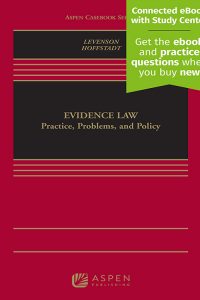
Laurie L. Levenson (Loyola Law School, Los Angeles)
Evidence Law: Policy, Practice, and Problems, First Edition
Aspen Publishing
Aspen Publishing, September 2022
This book provides a suitable foundation for most students to learn and apply, both in litigation and transactional practices, federal and state evidence laws. This is a masterful, comprehensive, and stimulating teaching tool, with its unique approach of (1) providing the rule; (2) explaining the basis for the rule; (3) demonstrating how it is to be applied; (4) discussing any complications in its application; and (5) providing short, where appropriate, carefully edited cases, regarding the rule. Cases in the book serve to affirm the rule, not provide subtle or exceptional applications of it.
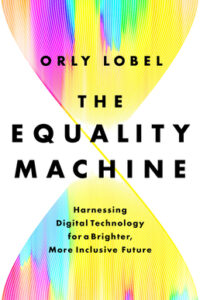
Orly Lobel (University of San Diego)
The Equality Machine: Harnessing Digital Technology for a Brighter, More Inclusive Future
Public Affairs, 2022
At a time when AI and digital platforms are under fire, Orly Lobel, a renowned tech policy scholar, defends technology as a powerful tool we can harness to achieve equality and a better future. Much has been written about the challenges tech presents to equality and democracy. But we can either criticize big data and automation or steer it to do better. Lobel makes a compelling argument that while we cannot stop technological development, we can direct its course according to our most fundamental values. With provocative insights in every chapter, Lobel masterfully shows that digital technology frequently has a comparative advantage over humans in detecting discrimination, correcting historical exclusions, subverting long-standing stereotypes, and addressing the world’s thorniest problems: climate, poverty, injustice, literacy, accessibility, speech, health, and safety. Lobel’s vivid examples—from labor markets to dating markets—provide powerful evidence for how we can harness technology for good. The book’s incisive analysis and elegant storytelling will change the debate about technology and restore human agency over our values.
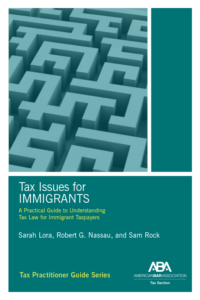
Sarah Lora (Lewis & Clark Law School), Robert G. Nassau, Sam Rock
Tax Issues for Immigrants
ABA Tax Section, 2022
The book introduces the reader to the basics of taxation for immigrants, their spouses, and their dependents, plus immigration law as it intersects with tax law. With the increasingly complex obligations of immigrant taxpayers, especially after the PATH Act and the TCJA, Tax Issues for Immigrants seeks to provide assistance to practitioners guiding clients through the intersection of immigration law and tax law. An expansion of a chapter in Effectively Representing Your Client Before the IRS, the book introduces different types of immigrant statuses and how the tax code treats them, and examines how the tax code treats resident and nonresident taxpayers and taxpayers with spouses and/or dependents in foreign countries. The book also looks at how the tax code treats taxpayers, spouses, and dependents with ITIN numbers, including their eligibility for dependent exemptions, head of household filing status, and credits. It provides general information about the immigration consequences for filing or non-filing of returns, as well as nonpayment of taxes, and it discusses taxpayer language access rights when communicating with the IRS.
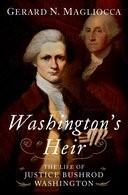
Gerard N. Magliocca (Indiana University Robert H. McKinney School of Law)
Washington’s Heir: The Life of Justice Bushrod Washington
Oxford University Press, 2022
In Washington’s Heir, Gerard N. Magliocca provides the first published biography of Bushrod Washington, one of the least studied Founding Fathers. Born in 1762, Justice Washington fought in the Revolutionary War, served in Virginia’s ratifying convention for the Constitution, and was Chief Justice John Marshall’s partner in establishing the authority of the Supreme Court. An in-depth look at Justice Washington’s story that gives insight into his personal thoughts through his own secret journal, Washington’s Heir sheds new light not only on George Washington, John Marshall, and the Constitution, but also on America’s ongoing struggle to become a more perfect union.
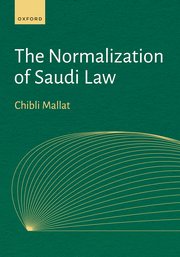
Chibli Mallat (University of Utah S.J. Quinney College of Law)
The Normalization of Saudi Law
Oxford University Press, 2022
Saudi Arabia has never commanded more attention and yet it remains one of the world’s least understood countries. The book dives into the heart of Saudi society, politics, and business by exploring the workings of its courts. Legal practitioners and scholars will find a comprehensive analysis of the law’s operation in the kingdom. The practitioner will access full thematic coverage of all important fields: judicial organization, contracts and torts, crime, family, property, administration, commerce, companies, banking, insolvency, the stock market, the constitution, succession, and human rights, with major statutes and a large number of court decisions.
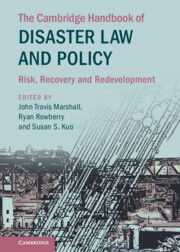
John Travis Marshall (Georgia State University College of Law) Ryan Rowberry (Georgia State University College of Law) Susan Kuo (University of South Carolina School of Law)
The Cambridge Handbook of Disaster Law and Policy
Cambridge University Press, October 2022
This century’s major disasters from Hurricane Katrina and the Fukushima nuclear meltdown to devastating Nepalese earthquakes and the recent crippling volcanic eruptions and tsunamis in Tonga have repeatedly taught that government institutions are ill-prepared for major disaster events, leaving the most vulnerable among us unprotected. These tragedies represent just the beginning of a new era of disaster – an era of floods, heatwaves, droughts, and pandemics fueled by climate change. Laws and government institutions have struggled to adapt to the scope of the challenge; old models of risk no longer apply. This Handbook provides timely guidance, taking stock of the field of disaster law and policy as it has developed since Hurricane Katrina. Experts from a wide range of academic and practical backgrounds address the root causes of disaster vulnerability and offer solutions to build more resilient communities to ensure that no one is left behind.
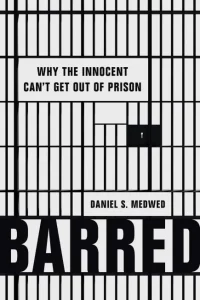
Daniel Medwed (Northeastern University School of Law)
Barred: Why the Innocent Can’t Get Out of Prison
Basic Books/Hachette Book Group, 2022
Thousands of innocent people are behind bars in the United States. But proving their innocence and winning their release is nearly impossible. In the book, the author argues that our justice system’s stringent procedural rules are largely to blame for the ongoing punishment of the innocent. Those rules guarantee criminal defendants just one opportunity to appeal their convictions directly to a higher court. Afterward, the wrongfully convicted can pursue only a few narrow remedies. Even when there is strong evidence of a miscarriage of justice, rigid guidelines, bias, and deference toward lower courts all too often prevent exoneration. Offering clear explanations of legal procedures alongside heart-wrenching stories of their devastating impact, the book exposes how the system is stacked against the innocent and makes a powerful call for change.

Carrie Menkel-Meadow (University of California, Irvine School of Law)
A Very Short Introduction to Negotiation
Oxford University Press, 2022
Negotiation is essential for peace and international relations, but also for economically efficient trades and bargains in business, and for problem solving skills in workplaces, families, and interpersonal interactions. This book provides a comprehensive and accessible review of both conceptual and behavioral approaches to the human process of negotiation. The author draws on research in constituent fields of human psychology, diplomacy, law, business, anthropology, game theory, decision making, international relations, sociology, public policy, and economics, suggesting models for creative problem solving to often intractable problems.
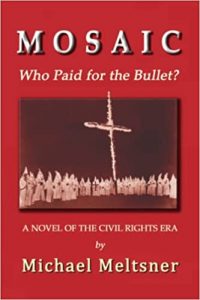
Michael Meltsner (Northeastern University School of Law)
Mosaic: Who Paid For The Bullet?
Quid Pro Books, 2022
The book brings to life the compelling story of the 60s murder of a charismatic woman doctor who courted danger trying to dismantle a racially segregated healthcare system in a large southern city.
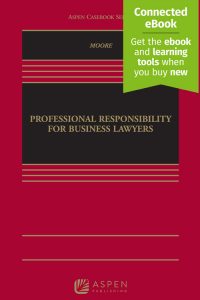
Nancy Moore (Boston University School of Law)
Professional Responsibility for Business Lawyers
Aspen Publishing, January 2022
This new casebook covers the fundamental components of a traditional Professional Responsibility course with a focus on how these issues arise in a transactional business law practice. It is designed for use in either a two- or three-credit basic course in Professional Responsibility course or an advanced course or seminar specifically on PR in business and transactional law. The traditional pedagogical approach uses a mixture of narrative and descriptive content, edited cases and ethics opinions, discussion questions, and problems.
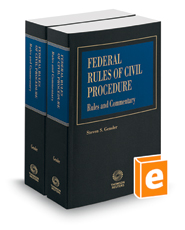
Lumen N. Mulligan (University of Kansas School of Law), Steven S. Gensler (University of Oklahoma College of Law)
Federal Rules of Civil Procedure, Rules and Commentary, 2022 ed.
Thomson Reuters, 2022
This is the premier practice-oriented guide to using the Federal Rules of Civil Procedure, written by two leading experts including a former member of the Civil Rules Advisory Committee. The authors explain in detail what each rule covers, how it works, how it has been interpreted by courts, and how it is used in practice. This title is updated annually with new rule amendments, the latest caselaw, and emerging trends and issues integrated directly into the analysis. Special emphasis and expanded coverage is given to the topics that matter the most in practice, including pleading and amendments, motions to dismiss, discovery, and summary judgment.
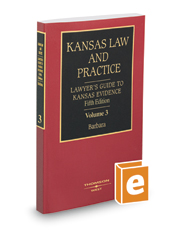
Lumen N. Mulligan (University of Kansas School of Law), Chelsi Hayden (Nebraska College of Law)
Lawyer’s Guide to Kansas Evidence, 5th (Vol. 3, Kansas Law and Practice)
Thomson Reuters, 2022
Lawyer’s Guide to Kansas Evidence covers the Kansas Rules of Evidence, plus objections and evidentiary foundations. It compares the Kansas and Federal Rules of Evidence in a user-friendly format, so readers can confidently follow the correct procedure in making and meeting trial objections. The text emphasizes the burden of proof required in the introduction of evidence and includes techniques for: Making a proffer, introducing physical and demonstrative evidence, and examining witnesses.
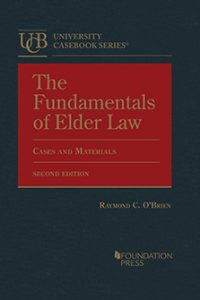
Raymond C. O’Brien (The Catholic University of America Columbus School of Law)
Fundamentals of Elder Law (2d ed.)
Foundation Press, 2022
This casebook continues to provide the fundamentals for a lively, contemporary course in elder law. It emphasizes illustrative factual cases and statutes, and is supported by materials from elder law practitioners and statistical data. It is distinctive in its emphasis upon state and federal court decisions, not simply a recitation of statutory provisions. This edition continues the discussion on ageism, the pandemic of elder abuse in all its forms, and discrimination in housing and employment.
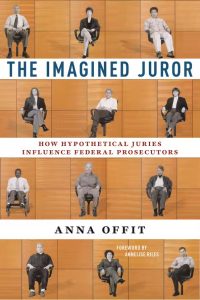
Anna Offit (Southern Methodist University)
The Imagined Juror: How Hypothetical Juries Influence Federal Prosecutors
NYU Press, 2022
Thanks to television and popular media, the jury is deeply embedded in the American public’s imagination of the legal system. For the country’s federal prosecutors, however, jurors have become an increasingly rare sight. This book examines the counterintuitive importance of jurors in federal prosecutors’ work at a moment when jury trials are statistically in decline.
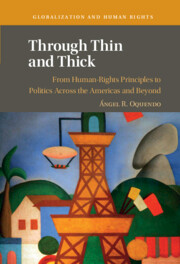
Ángel R. Oquendo (University of Connecticut School of Law)
Through Thin and Thick
Cambridge University Press, June 2022
The book launches with examples, concrete cases, or political confrontations to explain how to conceive the safeguards at stake. For instance, free speech demands permitting seemingly offensive expression plus promoting a diverse and open public debate. The work scrutinizes specific guaranties, such as those pertaining to asylum, citizenship, abortion, due process, self-determination, or the environment. It presents them as engendering problems peculiar to them. Next, the discussion dissects how precepts, like human rights and democracy, may contingently clash despite their overall commensurability. Finally, it underscores the interconnection of negative, substantive, and national entitlements with their positive, procedural, and international counterparts.
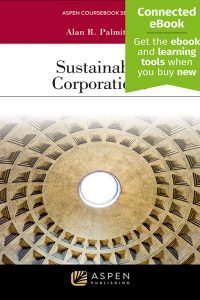
Alan R. Palmiter (Wake Forest University School of Law)
Sustainable Corporations
Aspen Publishing, September 2022
The book offers synthesized readings from law, management, philosophy, psychology, sociology, even biology – written by academics, journalists, business people, poets, bloggers, scientists, even religious leaders. The book focuses on the elusive “sustainable corporation” and is designed for an upper-level course sequenced after the basic corporations course.
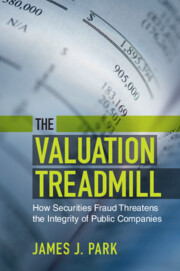
James Park (University of California, Los Angeles School of Law)
The Valuation Treadmill: How Securities Fraud Threatens the Integrity of Public Companies
Cambridge University Press, 2022
Public companies now face constant pressure to meet investor expectations. A company must continually deliver strong short-term performance every quarter to maintain its stock price. This valuation treadmill creates incentives for corporations to deceive investors. Published more than twenty years after the passage of Sarbanes-Oxley, which requires all public companies to invest in measures to ensure the accuracy of their disclosures, The Valuation Treadmill shows how securities fraud became a major regulatory concern.
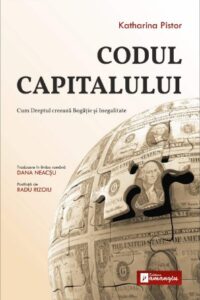
Katharina Pistor (Columbia Law School), Dana Neacsu (Duquesne Kline Law School), Radu Rizoiu (Facultatea de Drept a Universitatea București)
Codul capitalului : cum dreptul creează bogăție și inegalitate (Romanian translation of The Code of Capital: How the Law Creates Wealth and Inequality)
Editura Hamangiu, 2022
Codul Capitalului este o carte (aparent neortodoxa) care examineaza modul in care activele precum pamantul, datoria privata, organizatiile de afaceri sau know-how-ul sunt transformate in capital prin intermediul legislatiei si al unor instrumente juridice simple si arhicunoscute (dreptul de proprietate, fiducia, dreptul contractelor, dreptul corporatist sau dreptul insolventei).
(via Google Translate) The Capital Code is an (apparently unorthodox) book that examines how assets such as land, private debt, business organizations or know-how are transformed into capital through legislation and some simple and well-known legal instruments (property rights, trust, contract law, corporate law or insolvency law).
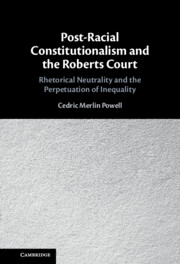
Cedric Merilin Powell (University of Louisville Brandeis School of Law)
Post-Racial Constitutionalism and the Roberts Court: Rhetorical Neutrality and the Perpetuation of Inequality
Cambridge University Press, 2022
Post-Racial Constitutionalism and the Roberts Court: rhetorical neutrality and the perpetuation of inequality analyses how the Roberts Court plays an essential role in advancing neutrality— “the way to stop discrimination on the basis of race is to stop discriminating on the basis on race”—to promote post-racialism. No use of race, even if it is in the promotion of eradicating inequality, is appropriate because we have a fair and neutral process that is legitimate. The Court has created a democratic myth of societal progress by promoting post-racialism: race and racism is never acknowledged, so the Court consistently reaches conclusions that erase the fundamental rights of historically oppressed groups. In comprehensive detail, the book discusses Rhetorical Neutrality, how the Court expresses itself through the language of neutrality.
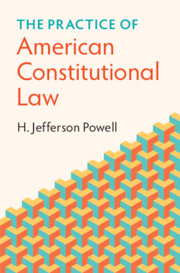
H. Jefferson Powell (Duke Law School)
The Practice of American Constitutional Law
Cambridge University Press, 2022
The book demonstrates that there is a longstanding, shared practice of constructing and evaluating constitutional law claims that transcends current political disagreements. The author describes how lawyers and judges identify constitutional problems by using a specifiable method of inquiry that enables them to agree on what the questions are, and thus what any plausible answer must address, even when disagreement over the most persuasive answers remains. Rather than being simply politics by other means, constitutional law is the successful practice of giving substance to the Constitution as supreme law.
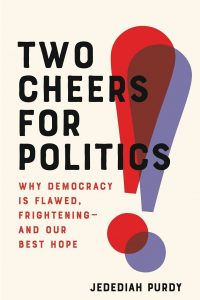
Jedediah Purdy (Duke Law School)
Two Cheers for Politics: Why Democracy is Flawed, Frightening—and Our Best Hope
Basic Books, 2022
Americans across the political spectrum agree that our democracy is in crisis. We view our political opponents with disdain, if not terror, and an increasing number of us are willing to consider authoritarian alternatives. The author argues that this heated political culture is a symptom not of too much democracy but too little. Today, the decisions that most affect our lives and our communities are often made outside the political realm entirely, as market ideology, constitutional law, and cultural norms effectively remove broad swaths of collective life from the table of collective decision. The result is a weakened and ineffective political system and an increasingly unequal and polarized society. If we wish to renew that society, we’ll need to claw back the ground that we’ve ceded to anti-politics and entrust one another with the power to shape our common life.
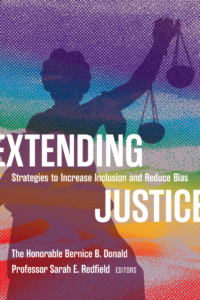
Sarah E. Redfield (University of New Hampshire Law), Bernice B. Donald
Extending Justice: Strategies to Increase Inclusion and Reduce Bias
Carolina Academic Press, 2022
Extending Justice: Strategies to Increase Inclusion and Reduce Bias offers expert perspective and actionable tools for interrupting bias. The first book in this series, Enhancing Justice: Reducing Bias, was written to increase awareness of implicit bias and serve as a benchbook for judges. This book goes the next step to be useful to a wider audience with virtually every chapter offering thoughtful context and practical strategies for interrupting unintentional bias. Edited by two proven leaders in the field, with twenty-six chapters written by fifty diverse authors, the voices here combine to provide wide-ranging and user-friendly science and tools.
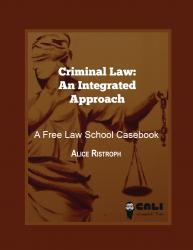
Alice Ristroph (Brooklyn Law School)
Criminal Law: An Integrated Approach
eLangdell Press, August 2022
This is a new textbook designed for a first-year law school course in criminal law. Its aim is to present an accurate overview of American criminal law as it operates in the twenty-first century, with attention to racial disparities and other inequalities and to the features of criminal law that produce these inequalities. The book covers basic principles of criminal liability and introduces students to standard definitions of property crimes, crimes against the person, and drug and gun offenses. Its approach is integrated in that students learn these areas of “substantive” law in context with the official decision-making that is crucial to the operation of criminal law in practice: criminalization, enforcement, and adjudication decisions.
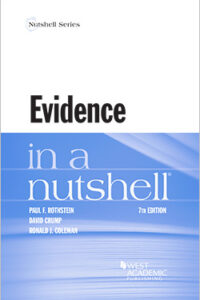
Paul F. Rothstein (Georgetown University Law Center), David Crump (University of Houston Law Center), and Ronald J. Coleman (Georgetown University Law Center)
Evidence in a Nutshell
West Academic, 2022
The latest version of the Federal Rules is the anchor of this book, with some state variations noted where important. The text summarizes significant U.S. Supreme Court decisions, including the latest Confrontation Clause cases; additional leading cases; forefront expert, scientific, and electronic evidence developments; and principal schools of evidentiary thought. Includes practical implementation as well as scholarly approaches. It pays attention to the litigation process as a whole and includes interdisciplinary cross-pollination where helpful. Numerous signpost-type headings and subheadings light the way, concisely summarizing the gist of each evidentiary concept. The detailed table of contents alone could serve as a complete course outline. Distinctively, an analytical, thoughtful approach is emphasized throughout.
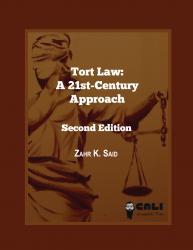
Zahr K. Said (University of Washington School of Law)
Tort Law: A 21st-Century Approach
eLangdell Press, August 2022
This book introduces students to tort law with a set of cases and methods that have been updated for 21st century legal education. Pairing classic cases with a host of recent, lesser-known cases, the casebook deliberately provides opportunities to engage with issues of race, gender, sexual orientation, ability, class as well as fundamental questions of civil justice. The book’s introduction diverges from the standard method of teaching torts, by framing the subject matter in terms of the three primary regimes of tort law—negligence, strict liability and the intentional torts—and by setting the stakes for questions of policy from the outset.
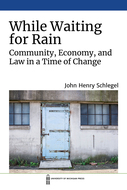
John Henry Schlegel (University at Buffalo School of Law)
While Waiting for Rain: Community Economy and Law in a Time of Change
University of Michigan Press, 2022
While Waiting for Rain: Community Economy and Law in a Time of Change covers a wide range of law and economy topics, reviewing the nation’s economic history and looking at Buffalo as an example of how a city devastated by the loss of its manufacturing base might find a brighter future.
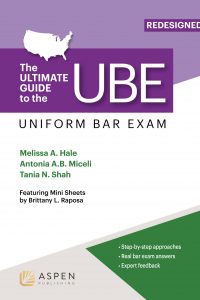
Tania Shah (Western State College of Law), Melissa Hale, (Loyola University Chicago School of Law), and Antonia Miceli (Saint Louis University)
The Ultimate Guide to the UBE Redesigned
Aspen Publishing, February 2022
Addressing the relative newness of the UBE, The book provides a detailed approach to the exam, utilizes real students’ past bar exam answers (including real bar exam scores), and includes commentary from expert contributors for added insight and perspective on how students can improve their own exam writing scores.
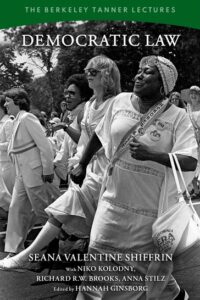
Seana Shiffrin (UCLA Law)
Democratic Law
Oxford University Press, 2022
In this book, based on her 2017 Berkeley Tanner Lectures, Seana Valentine Shiffrin offers an original, deontological account of democracy, law, and their interrelation. Her central thesis is that democracy and democratic law have intrinsically valuable, interconnected communicative functions. Democracy and democratic law together allow us to fulfill our fundamental duties to convey to each another messages of equal respect by fashioning the sorts of public joint commitments to act that a sincere message of equal respect requires. Law and democracy are essential to each other: the aspirations of democracy cannot be realized except through a legal system, and, conversely, law can fulfill its primary function only in a democratic context.
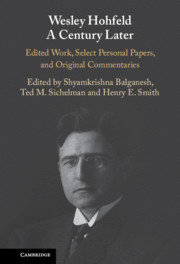
Ted M. Sichelman (University of San Diego), Shyamkrishna Balganesh (Columbia Law School), Henry E. Smith (Harvard Law School)
Wesley Hohfeld A Century Later: Edited Work, Select Personal Papers, and Original Commentaries
Cambridge University Press, 2022
Wesley Hohfeld is known the world over as the legal theorist who famously developed a taxonomy of legal concepts. His contributions to legal thinking have stood the test of time, remaining relevant nearly a century after they were first published. Yet, little systematic attention has been devoted to exploring the full significance of his work. Beginning with a lucid, annotated version of Hohfeld’s most important article, this volume is the first to offer a comprehensive look at the scope, significance, reach, intricacies, and shortcomings of Hohfeld’s work. Featuring insights from leading legal thinkers, the book also contains many of Hohfeld’s previously unseen personal papers, shedding new light on the complex motivations behind Hohfeld’s projects. Together, these selected papers and original essays reveal a portrait of a multifaceted and ambitious intellectual who did not live long enough to see the impact of his ideas on the study of law.
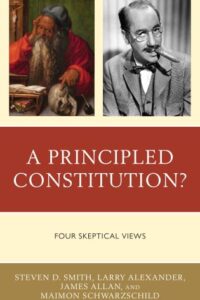
Steven D. Smith (University of San Diego), Larry Alexander (University of San Diego), James Allan (University of Queensland), Maimon Schwarzschild (University of San Diego)
A Principled Constitution?: Four Skeptical Views
Rowman & Littlefield, September 2022
Is the United States Constitution the embodiment of certain principles? The four authors of this book for a variety of reasons, and with somewhat different emphases, believe the answer is no. Those who authored the Constitution no doubt all believed in liberty, equality, and, with caveats, republican self-government values, or if you will, principles. But they had different conceptions of those principles and what those principles entailed for constituting a government. Although the Constitution they created reflected, in some sense, their principles, the Constitution itself was a specific list of do’s and don’ts that its creators hoped would gain the allegiance of the newly independent and sovereign states. And, for somewhat different reasons, the authors of this book believe that was a good thing.
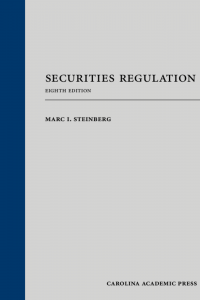
Marc I. Steinberg (Southern Methodist University, Dedman School of Law)
Securities Regulation (8th ed.)
Carolina Academic Press, 2022
This textbook provides a comprehensive and student-friendly source for students to grasp and learn this challenging subject matter. Nearly all of the key areas of securities regulation are covered, including definition of security, exemptions from registration, the Securities Act registration framework, resales of securities, due diligence in the securities offering context, Securities Act liability under Section 11, Section 12, and control person provision, Exchange Act Section lO(b) anti-fraud liability in private litigation, other remedial provisions that are employed in private litigation, secondary liability such as aiding and abetting, control person, and respondeat superior liability, insider trader, broker-dealer law, mergers and acquisitions, SEC enforcement, and attorney ethical obligations in the securities law setting.

Joshua C. Tate (Southern Methodist University, Dedman School of Law)
Power and Justice in Medieval England: the Law of Patronage and the Royal Courts
Yale University Press, 2022
Appointing a parson to the local church following a vacancy was one of the most important rights in medieval England. The question of law turned at the time the position needed to be filled. This book shows that the English needed new legal contours to address the questions of ownership and possession that arose from these disputes.
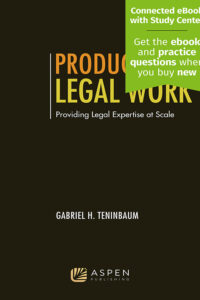
Gabriel H. Teninbaum (Suffolk University Law School)
Productizing Legal Work
Aspen Publishing, 2022
For millions of Americans, creating an estate plan no longer involves a high-priced attorney. Instead, they can log into LegalZoom and get the job done for a fraction of the cost. The same goes for filing a tax return: no need for a CPA, TurboTax can do it for you! At the heart of these tools (productized services) is a technique for converting work that has traditionally been done by a professional for a limited number of clients to work that can be shared, licensed or sold to a much wider audience (usually through the use of online or specialized software technologies). People create productized services in order to help more people and create new revenue streams. Consumers, in turn, get access to valuable services at lower cost. While creating productized services was once challenging and expensive, a new generation of facilitating tools enable any enterprising person – including law students and lawyers – to productize services with greater ease than ever before. This book unpacks the concept and impact of productizing services and provides a step-by-step introduction to the process of productizing legal work.
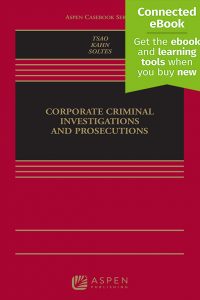
Leo R. Tsao (Harvard Law School), Daniel S. Kahn (Harvard Law School) and Eugene Soltes
Corporate Criminal Investigations and Prosecutions
Aspen Publishing, September 2022
Over the past two decades, corporate criminal liability has developed into one of the fastest-growing and most dynamic areas of legal practice. The growth of corporate criminal enforcement has correlated with a broad shift in how the government investigates and resolves corporate criminal violations. As a result of these developments, the practice of investigating, prosecuting, and resolving corporate criminal cases has many significant differences from other areas of criminal or civil law. In this book, the authors open a window into all aspects of corporate criminal investigations and prosecutions.
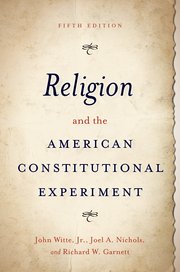
John Witte, Jr. (Emory University School of Law), Joel A. Nichols, (University of St. Thomas School of Law), and Richard W. Garnett (Notre Dame Law School)
Religion and the American Constitutional Experiment
Oxford University Press, 2022
This accessible and authoritative introduction tells the American story of religious liberty from its colonial beginnings to the latest Supreme Court cases. The authors analyze closely the formation of the First Amendment religion clauses and describe the unique and enduring principles of the American experiment in religious freedom – liberty of conscience, free exercise of religion, religious equality, religious pluralism, separation of church and state, and no establishment of religion.
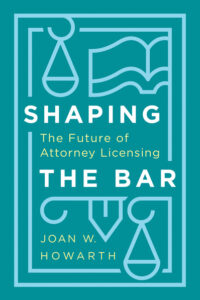
Joan W. Howarth (University of Nevada, Las Vegas Law and Michigan State University Law)
Shaping the Bar: The Future of Attorney Licensing
Stanford University Press, December 2022
In Shaping the Bar, Joan Howarth describes how the twin gatekeepers of the legal profession—law schools and licensers—are failing the public. Attorney licensing should be laser-focused on readiness to practice law with the minimum competence of a new attorney. According to Howarth, requirements today are both too difficult and too easy. Amid the crisis in unmet legal services, record numbers of law school graduates—disproportionately people of color—are failing bar exams that are not meaningful tests of competence to practice. At the same time, after seven years of higher education, hundreds of thousands of dollars of law school debt, two months of cramming legal rules, and success on a bar exam, a candidate can be licensed to practice law without ever having been in a law office or even seen a lawyer with a client.
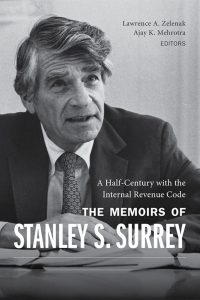
Lawrence A. Zelenak (Duke Law School) and Ajay K. Mehrotra (Northwestern Pritzker School of Law)
A Half-Century with the Internal Revenue Code: The Memoirs of Stanley S. Surrey
Carolina Academic Press, 2022
Stanley S. Surrey was the most prominent mid-twentieth-century American tax law academic, and the federal government official with the greatest influence on tax policy over that same period (aside from politicians). His professional life with the federal tax system spanned half a century, ending only with his death at the age of 73 in 1984. This edited volume includes an comprehensive introductory essay on Surrey’s professional life and his contributions to tax policy, as well as extensive annotations providing important background on the people and events Surrey discusses in the memoirs.
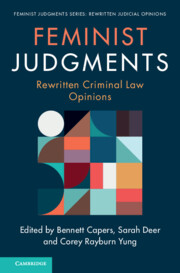
Corey Rayburn Yung (University of Kansas School of Law), Sarah Deer (University of Kansas School of Law), Bennett Capers (Fordham University School of Law)
Feminist Judgments: Rewritten Criminal Law Opinions
Cambridge University Press, December 2022
The authors explore the question: ‘Is it possible to be both a judge and a feminist?’ by re-writing seminal opinions that implicate critical dimensions of criminal law jurisprudence, from the sexual assault law to provocation to cultural defenses to the death penalty. We have had #MeToo campaigns and #SayHerName campaigns, and yet not enough has changed. The book looks at how all justice might look different through a feminist lens.
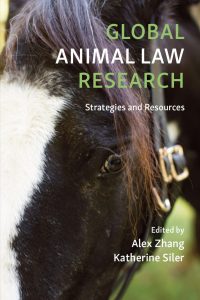
Alex Zhang (Duke Law School) and Katherine Siler (Stanford Law School)
Global Animal Law Research: Strategies and Resources
Carolina Academic Press, 2022
Across the globe, legal protection of animal rights continues to be a significant issue, and the level of protection varies dramatically among countries. Yet, no treatise has compiled resources and strategies on how to research these critical topics at both a domestic and international level. The purpose of this book is to fill the gap. Featuring 12 research experts specializing in U.S., foreign, international, and comparative law research, the book collects expert perspectives, knowledge, and experiences researching various animal rights and welfare topics.
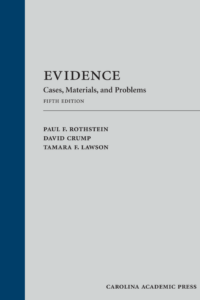
Paul F. Rothstein (Georgetown University Law Center), David Crump (University of Houston Law Center), Tamara Lawson (University of Washington School of Law)
Evidence Cases, Materials, and Problems
Carolina Academic Press, 2019
Evidence: Cases, Materials, and Problems by Rothstein, Crump, and Lawson is the best casebook available for understanding the Federal Rules, using them, and debating about them. It is up to date, with plenty of cases from the twenty-teens. Organized principally according to the Federal Rules, with significant state variations occasionally noted, the book’s copious, very descriptive section and subsection headings will help the professor to assign those parts that are desired.
